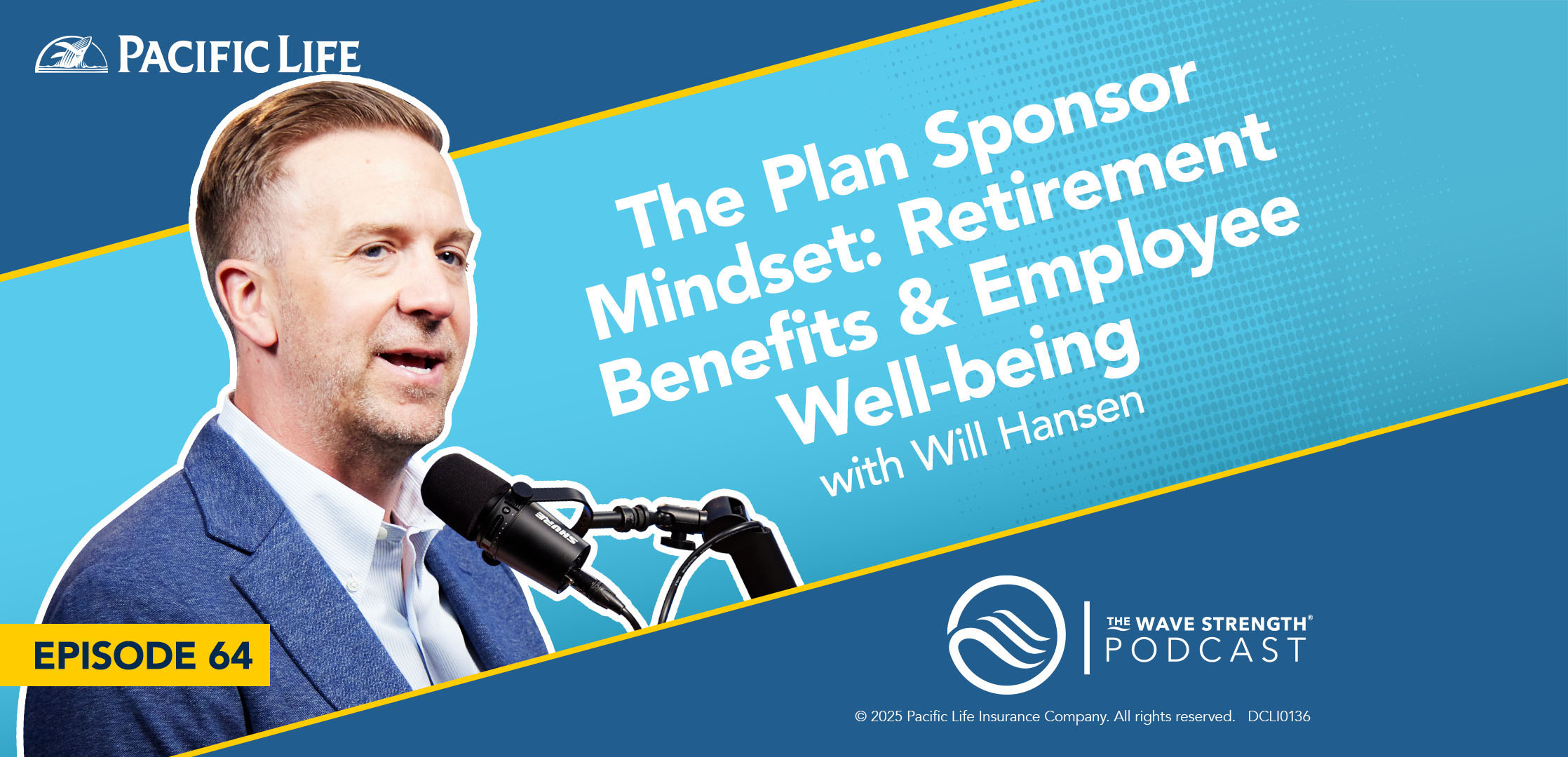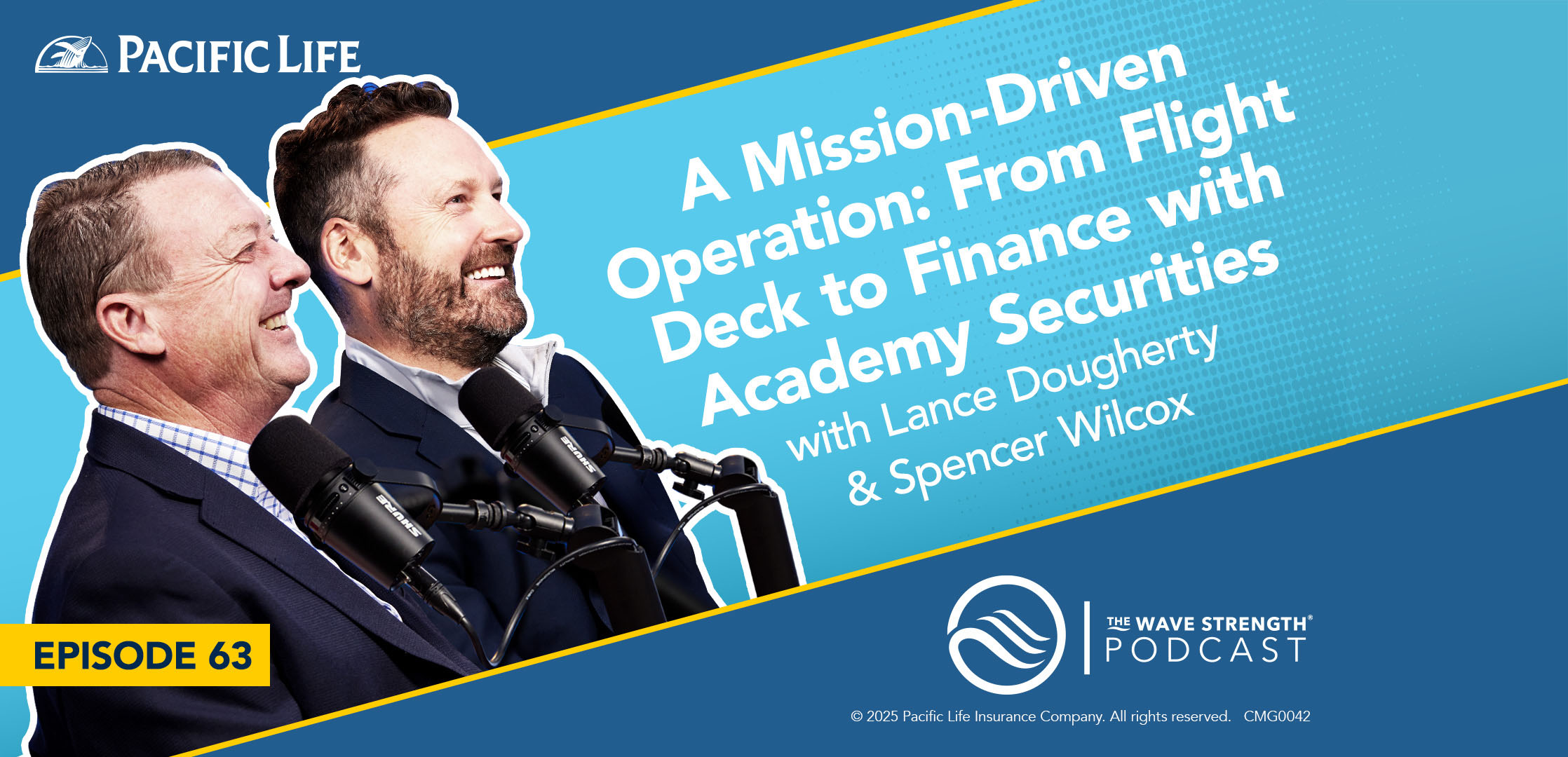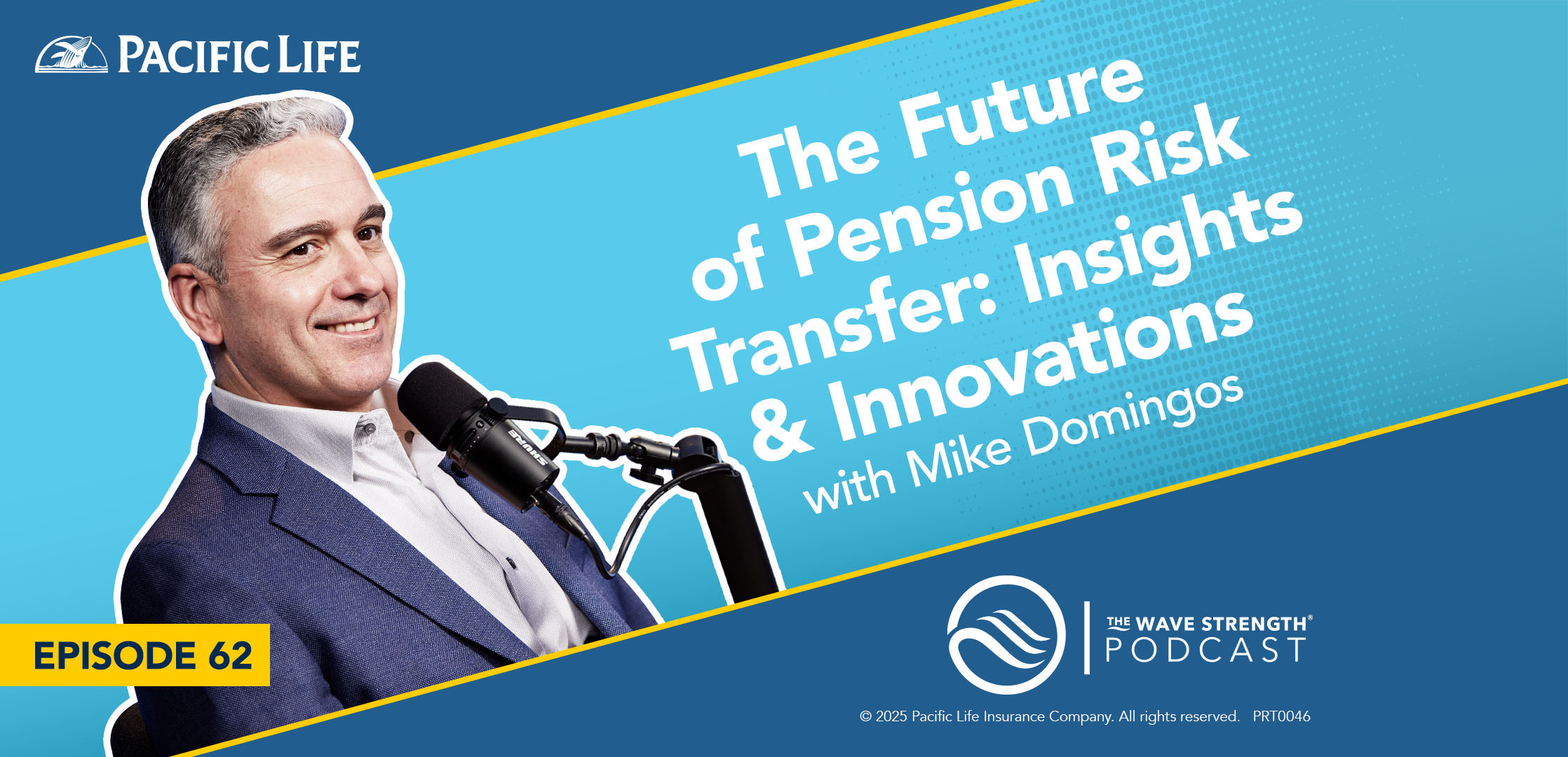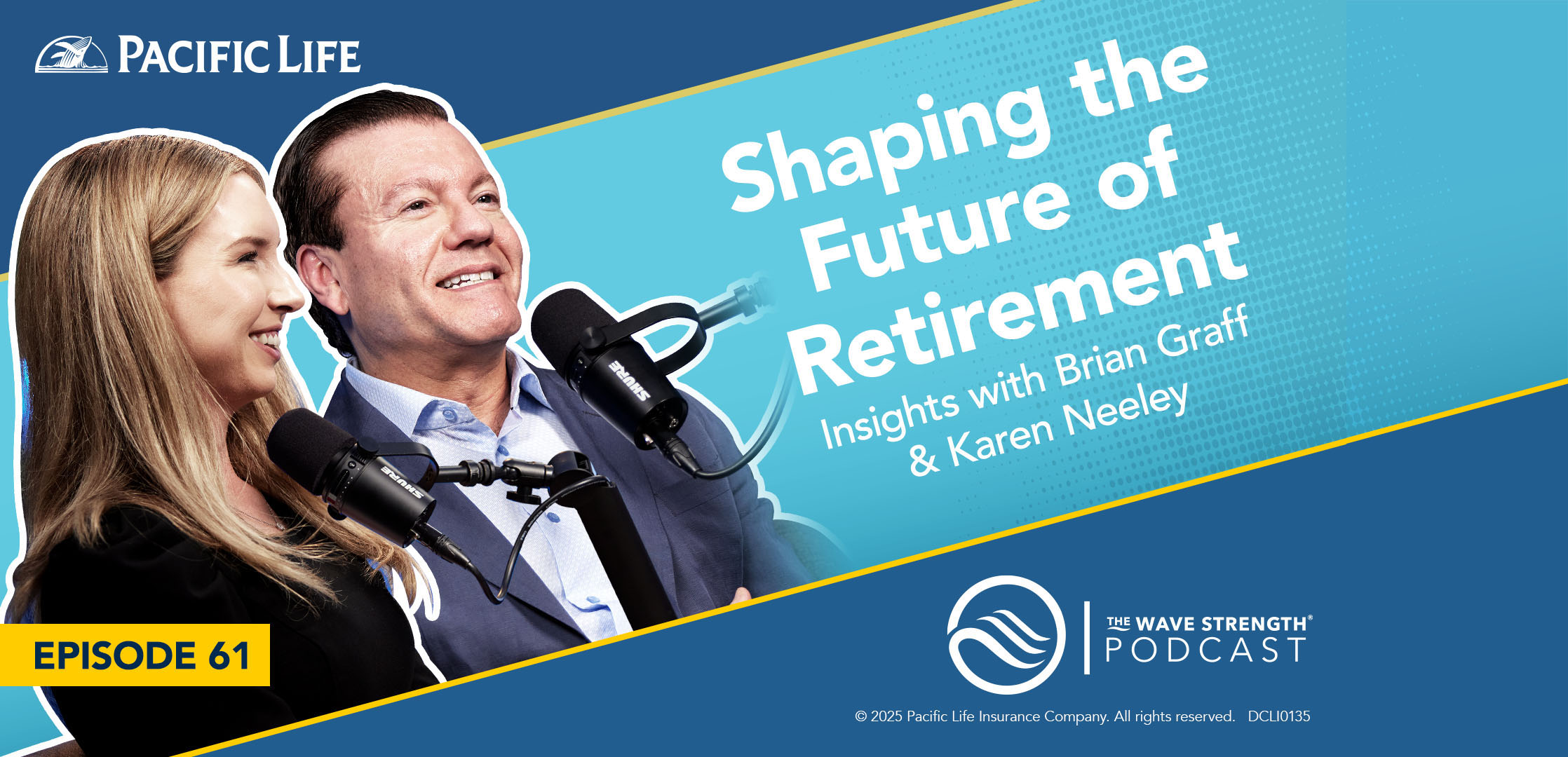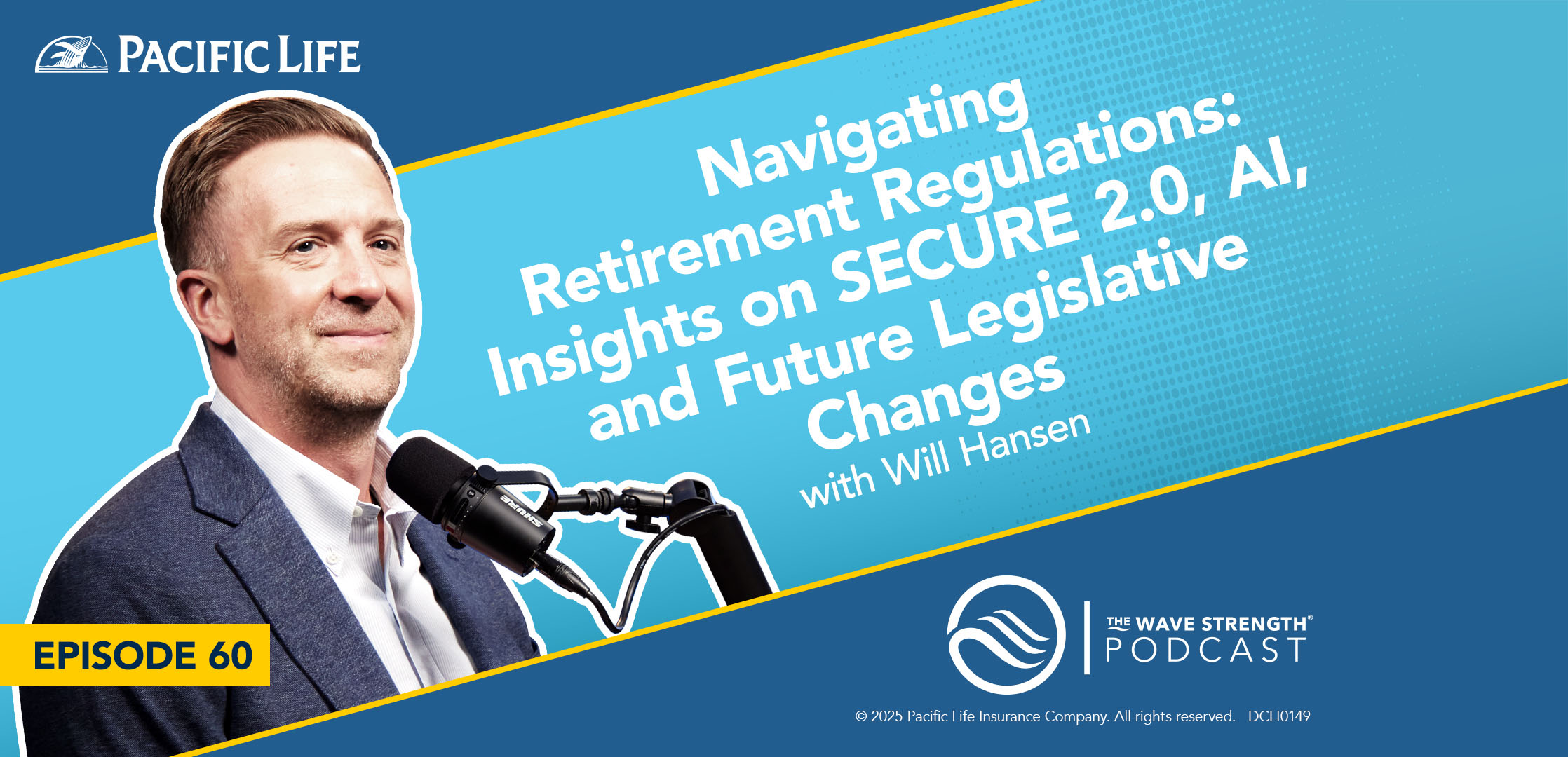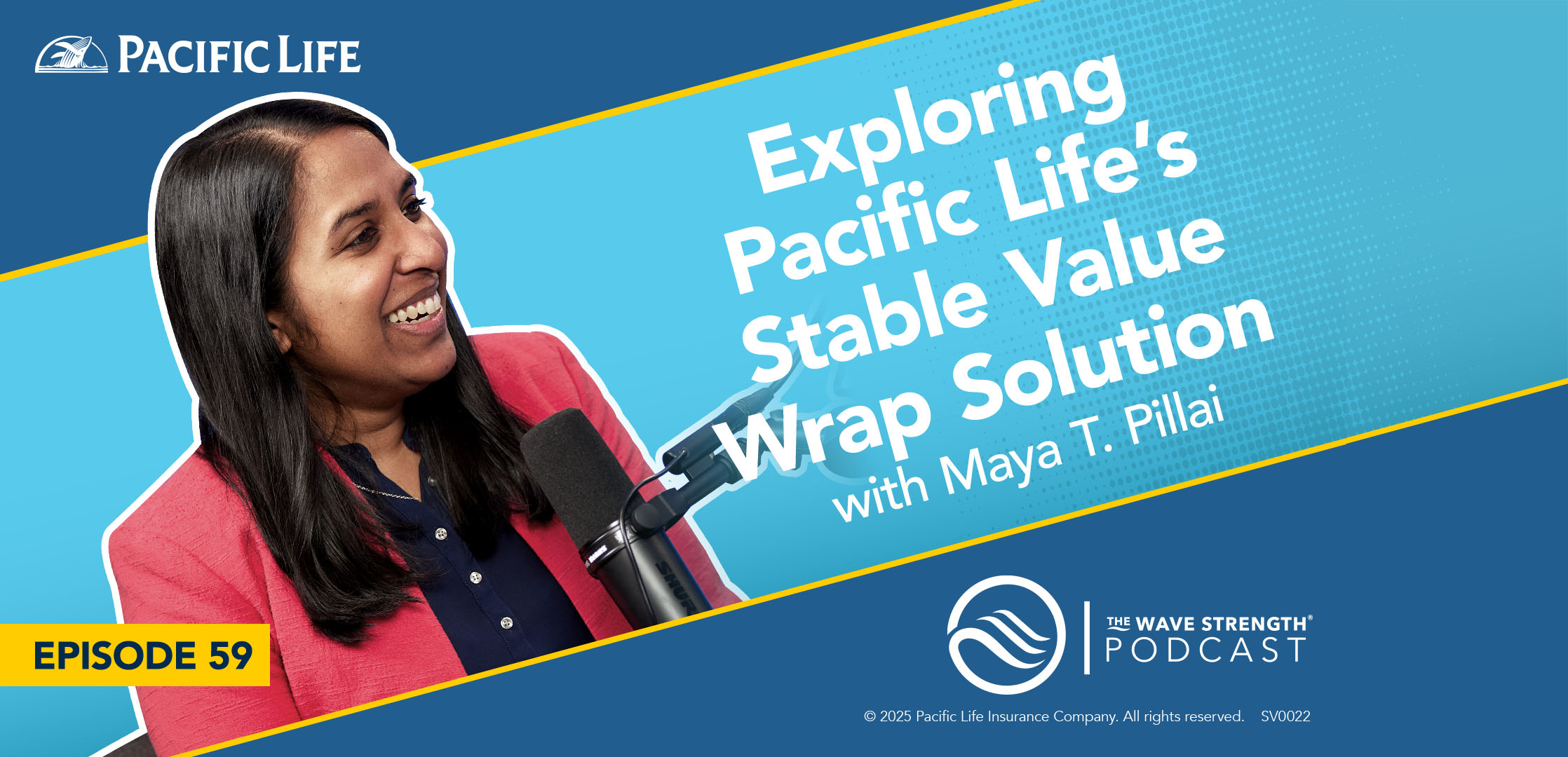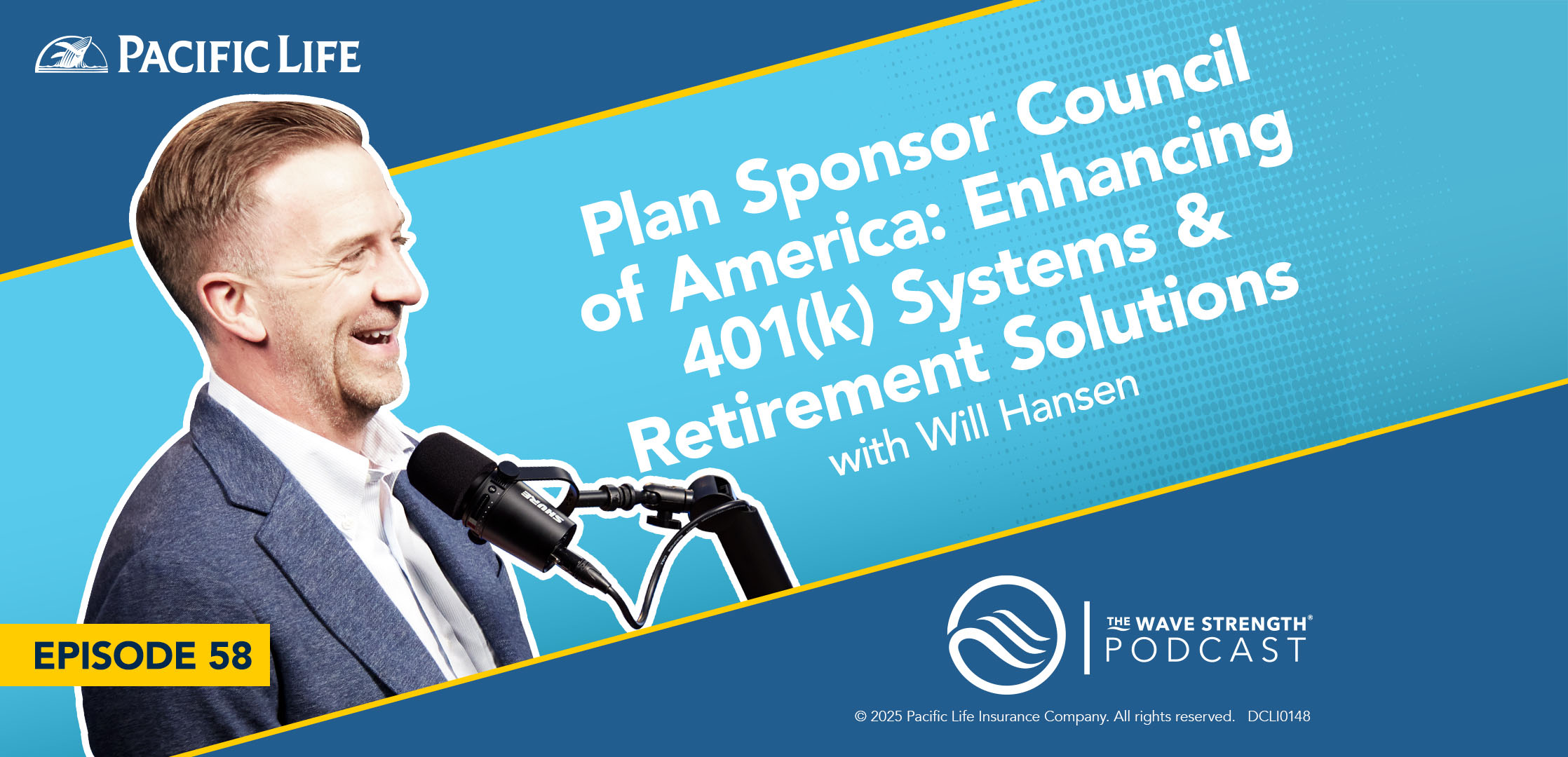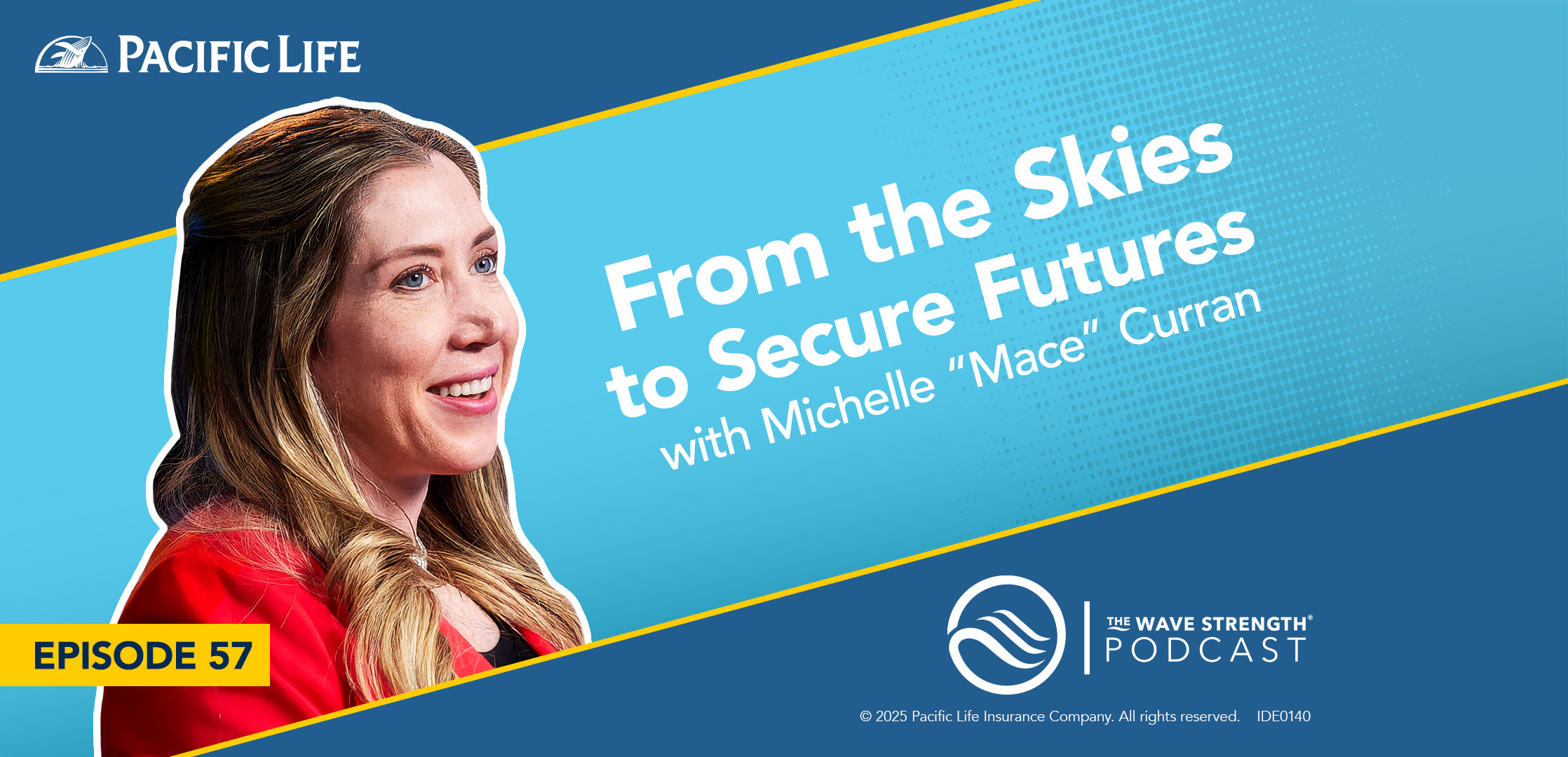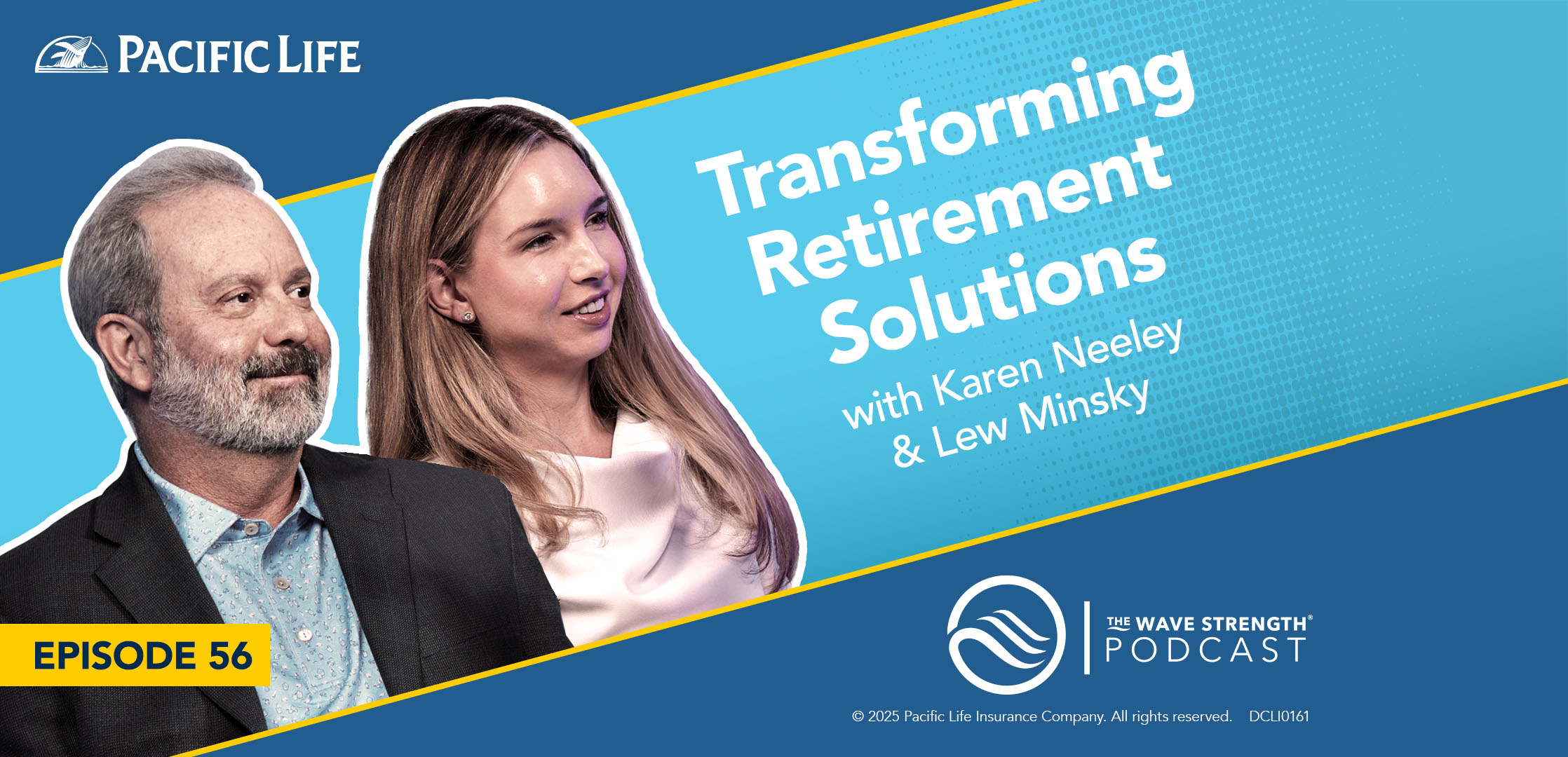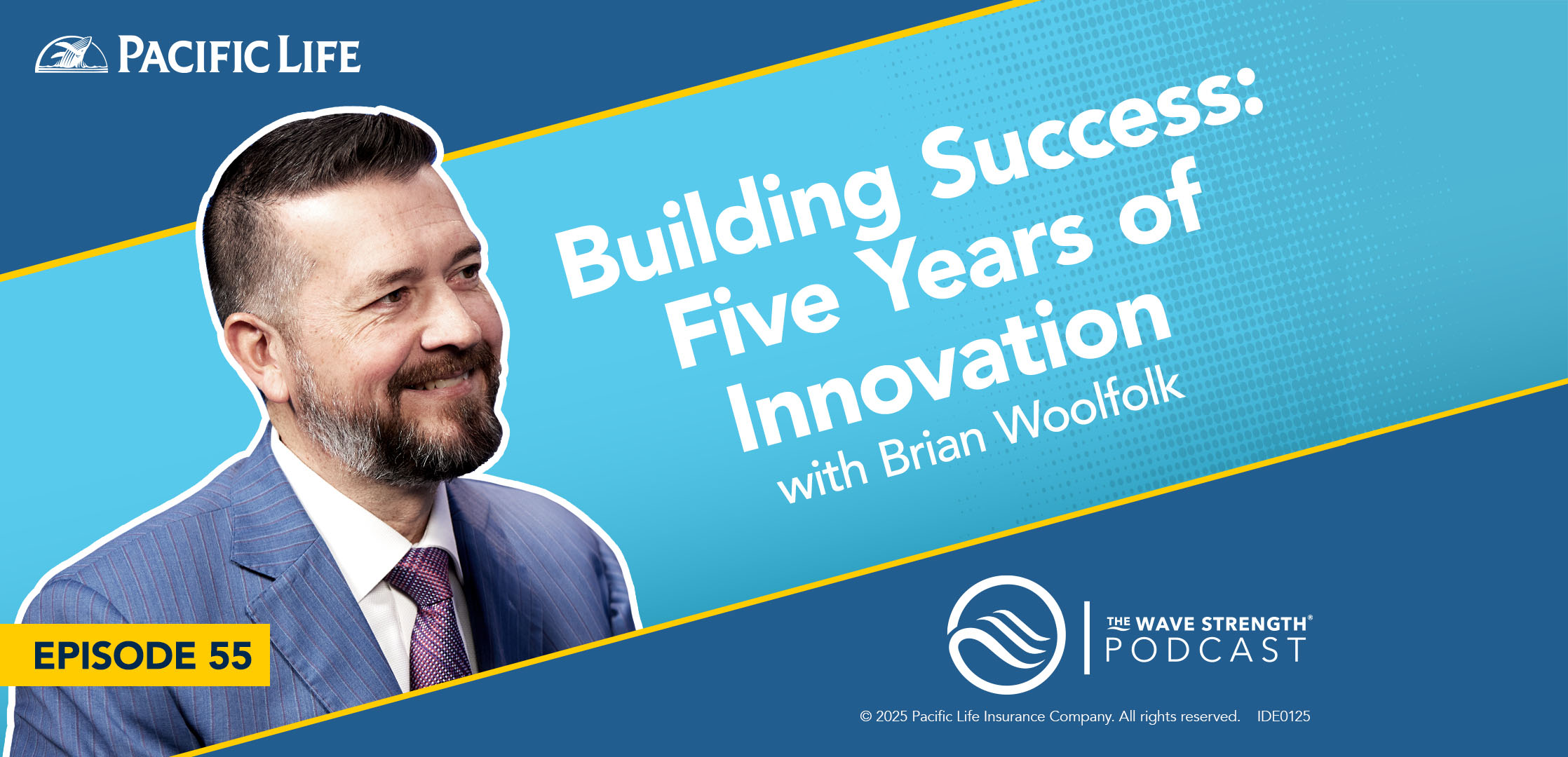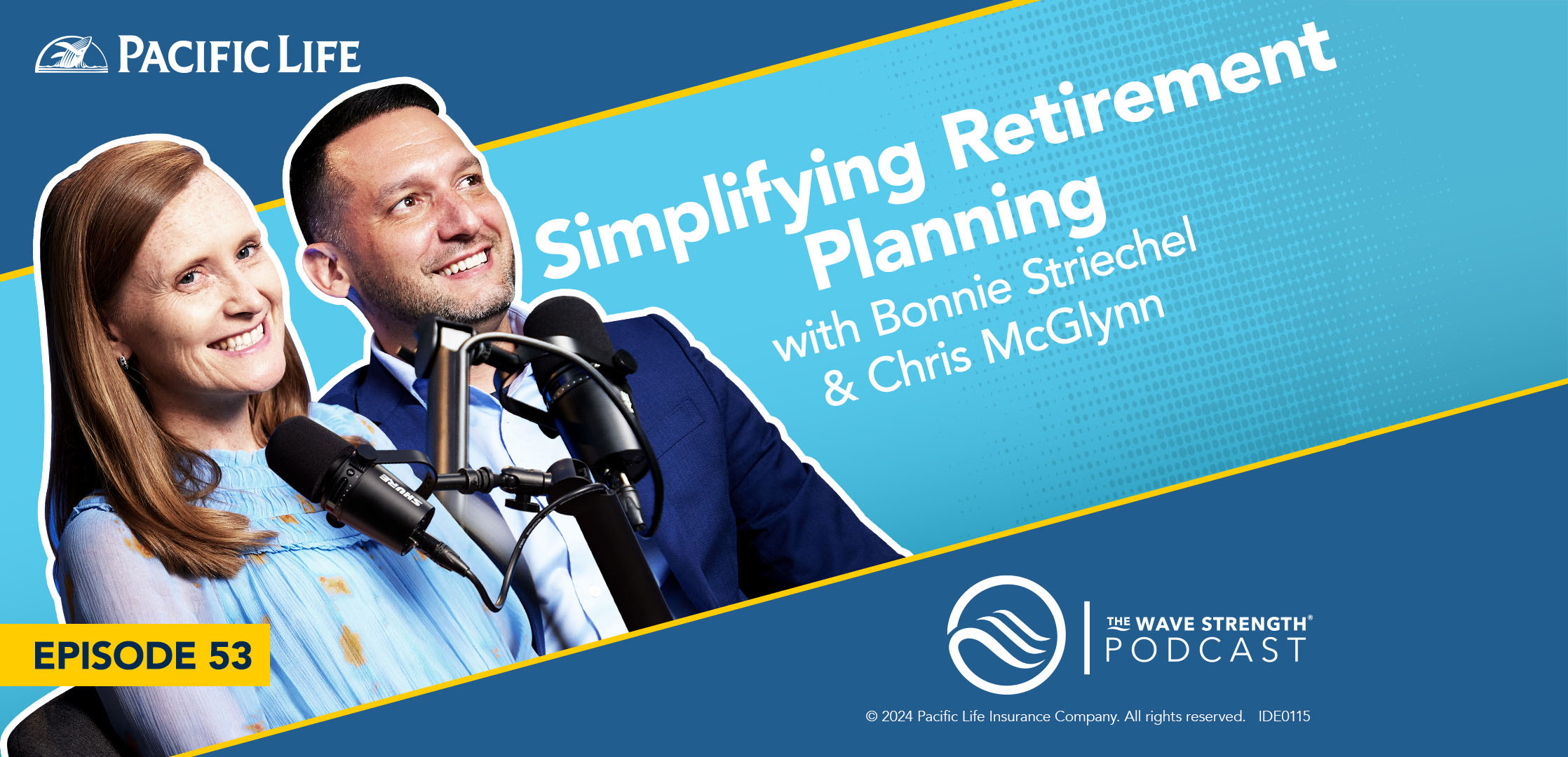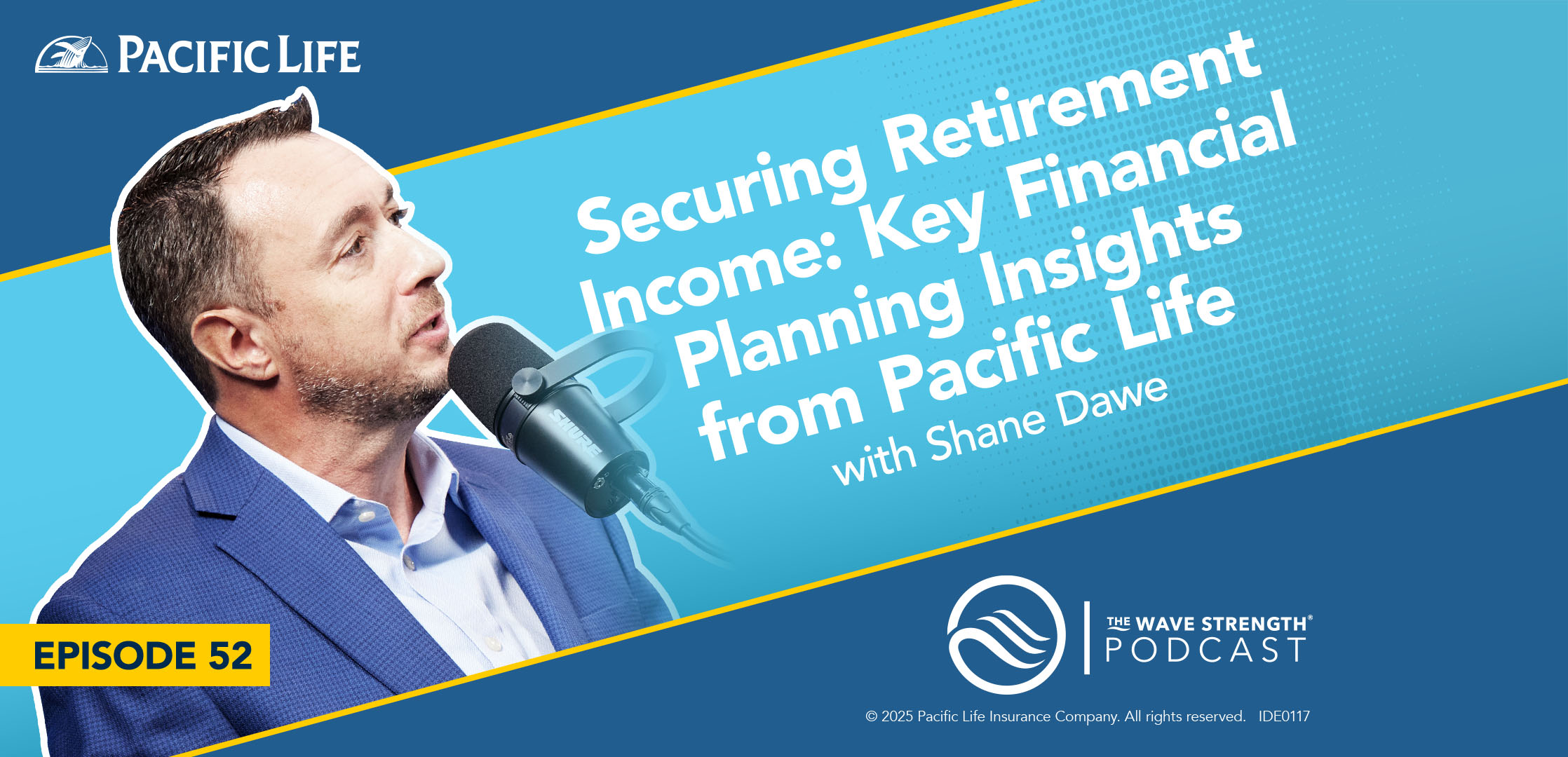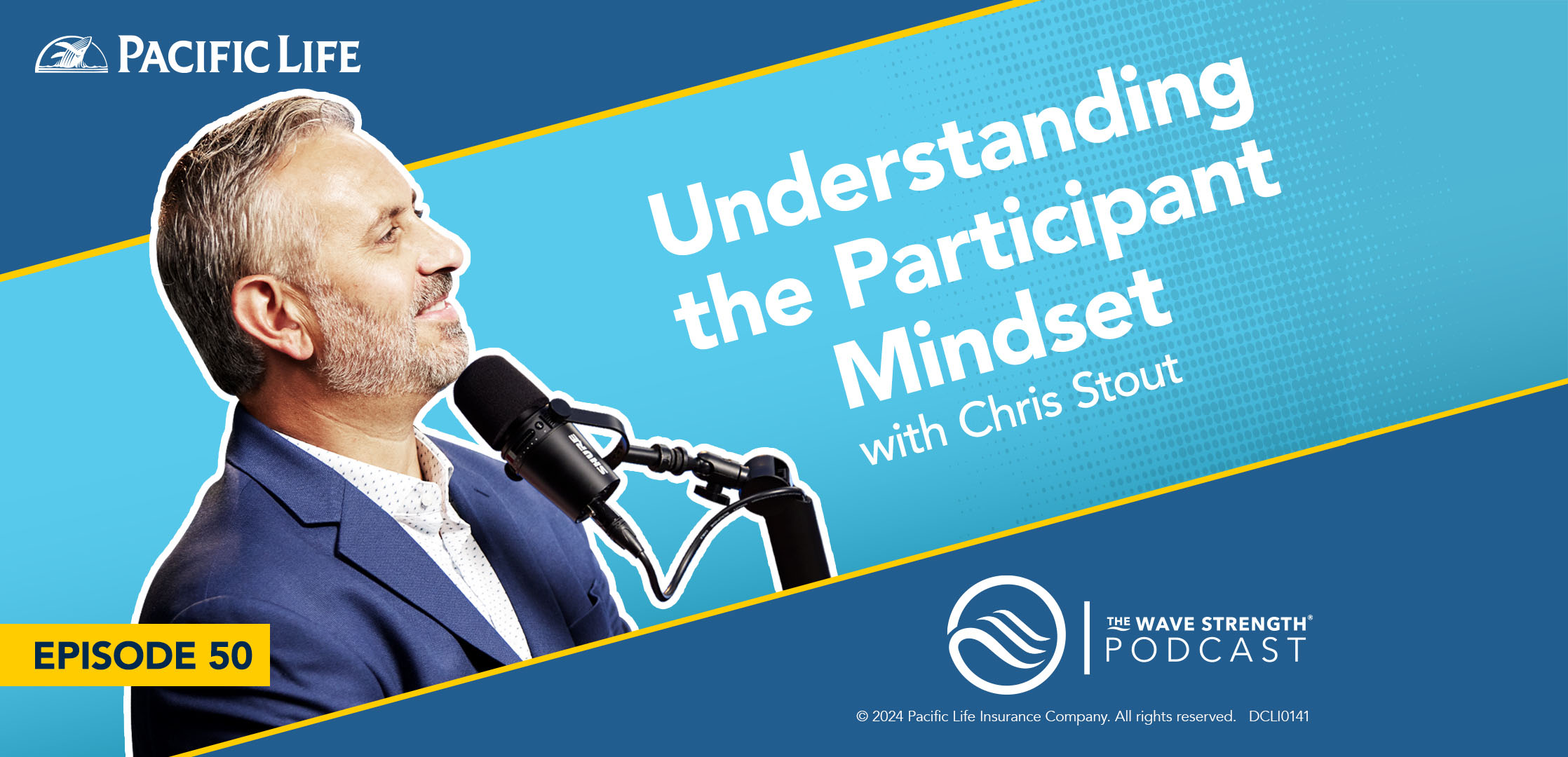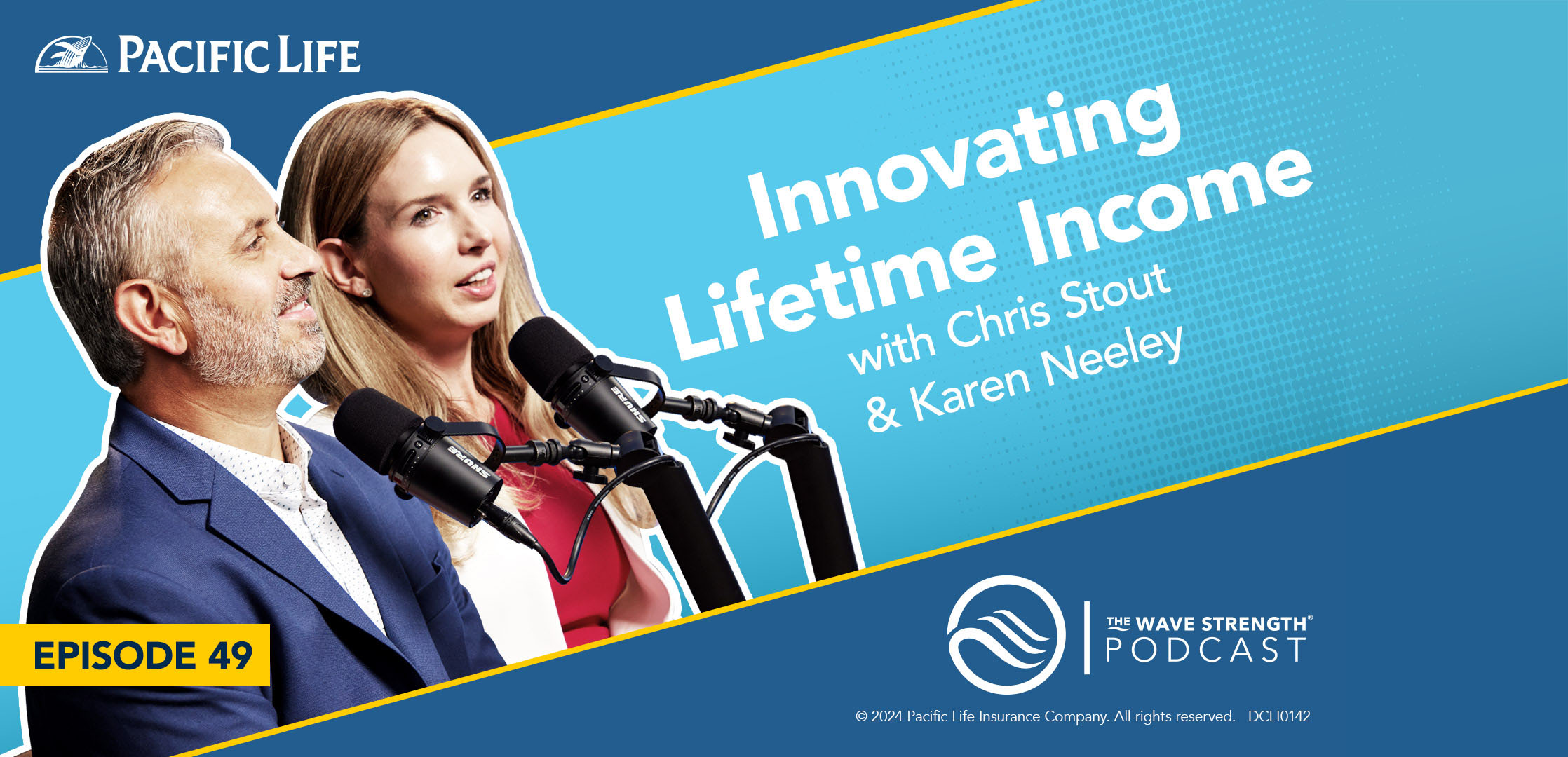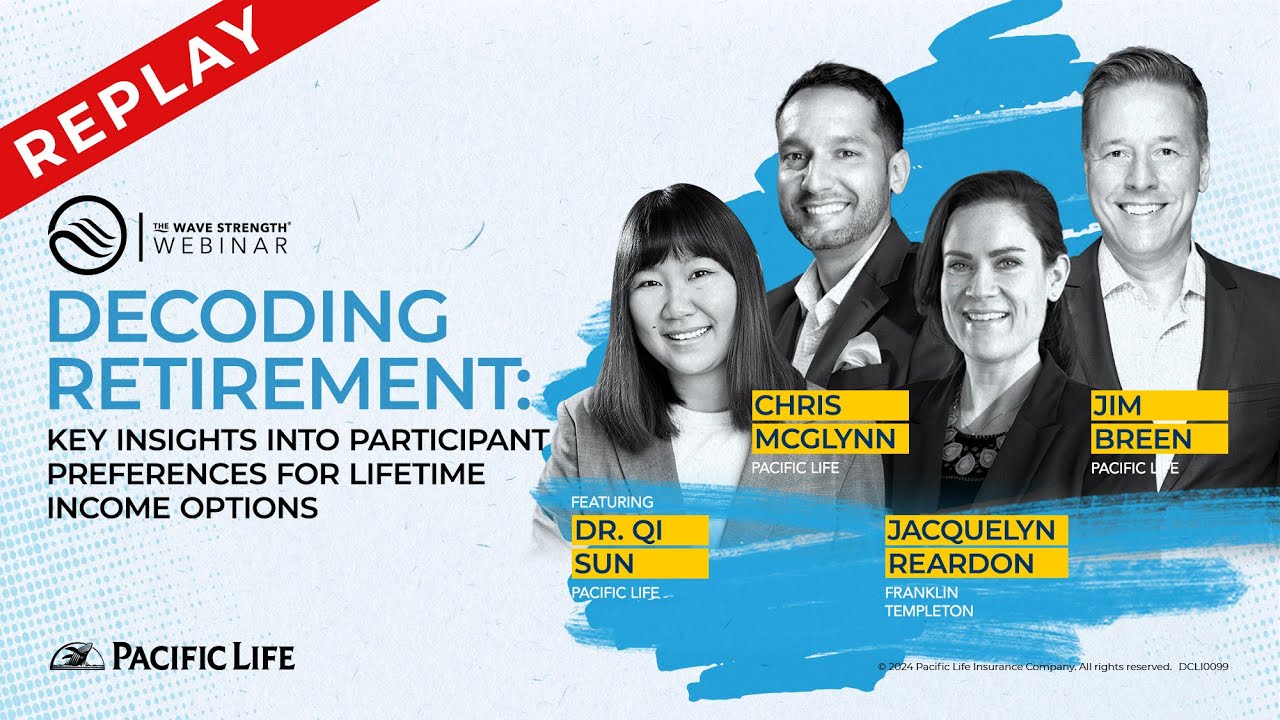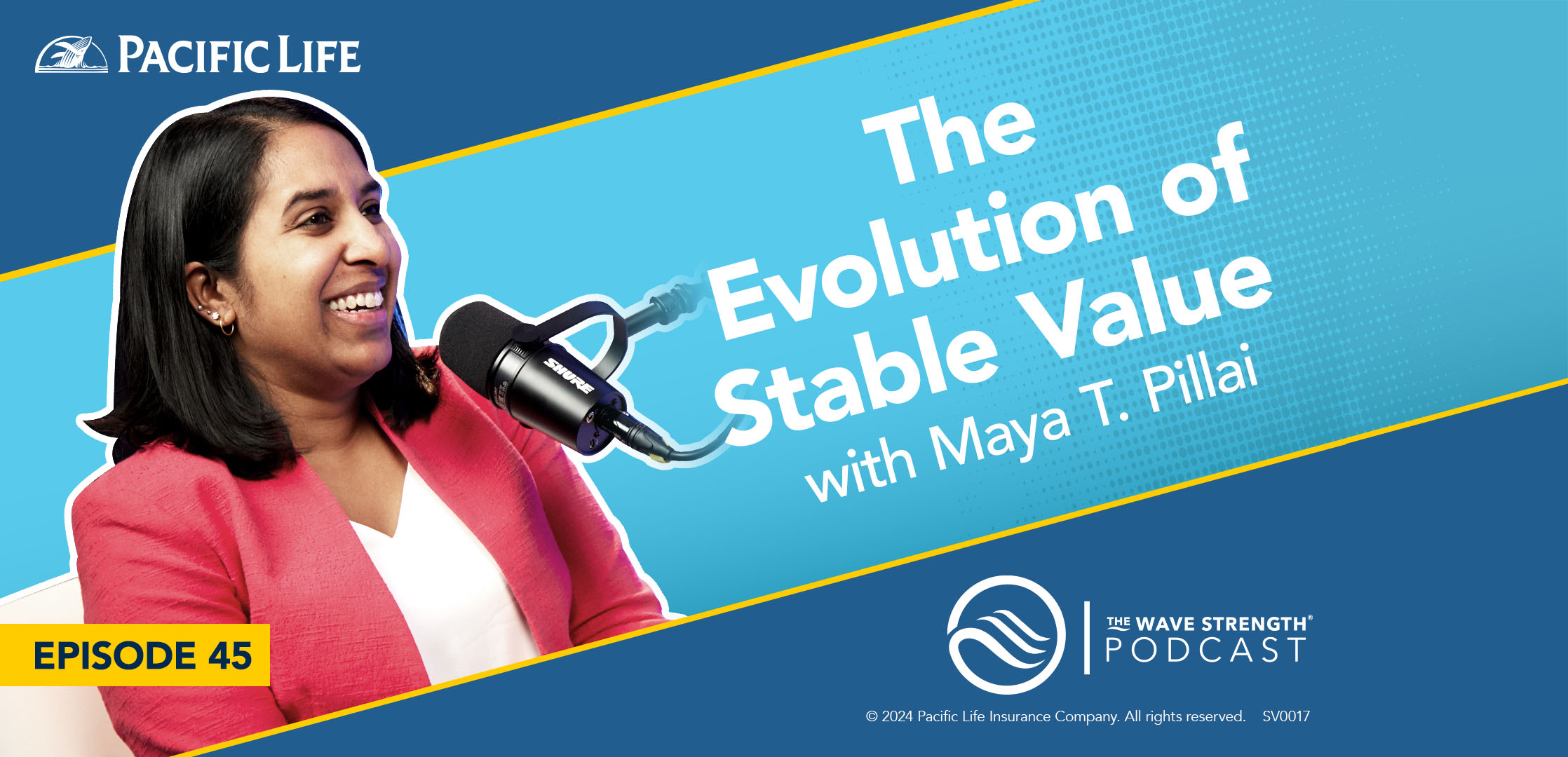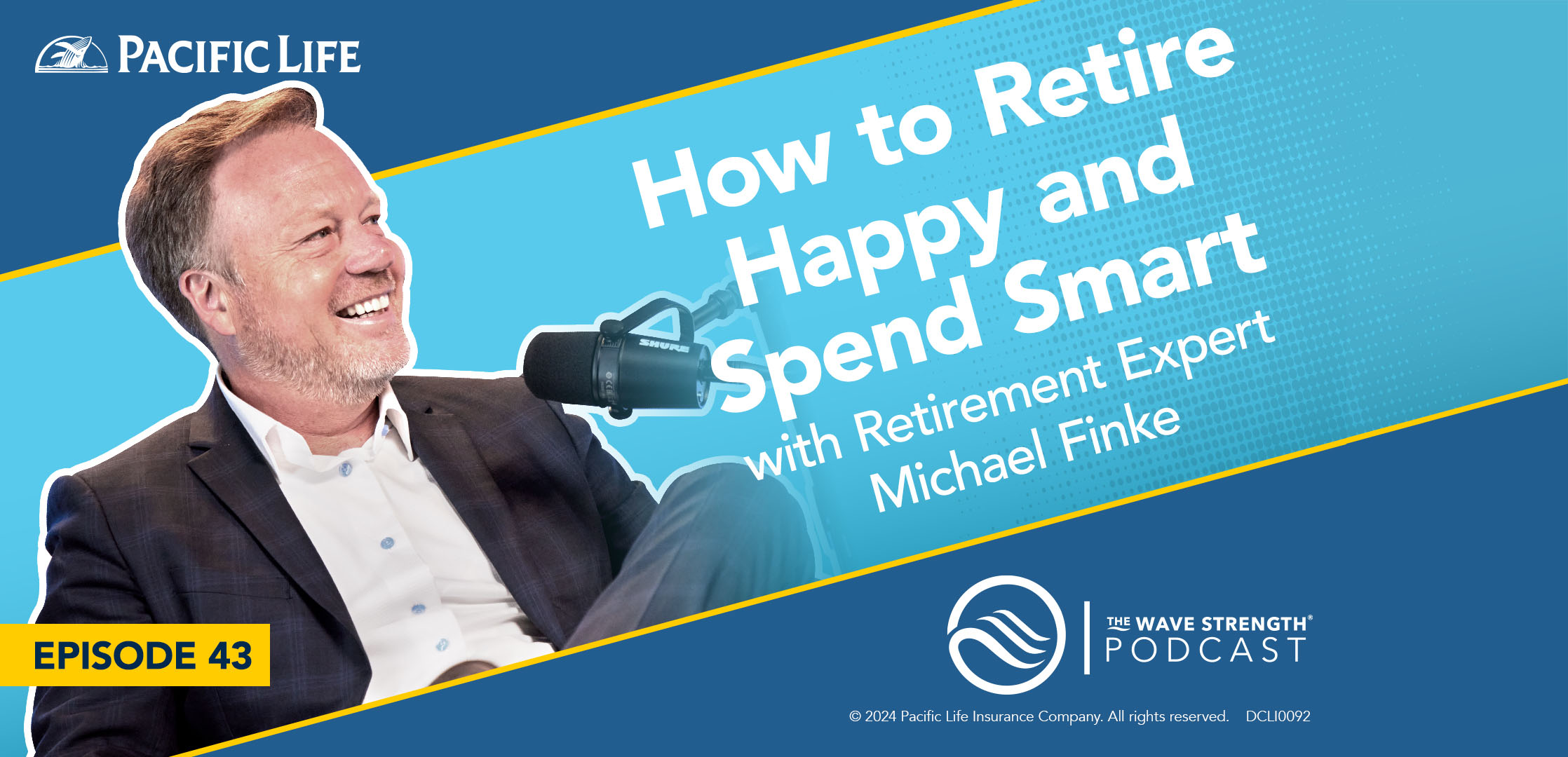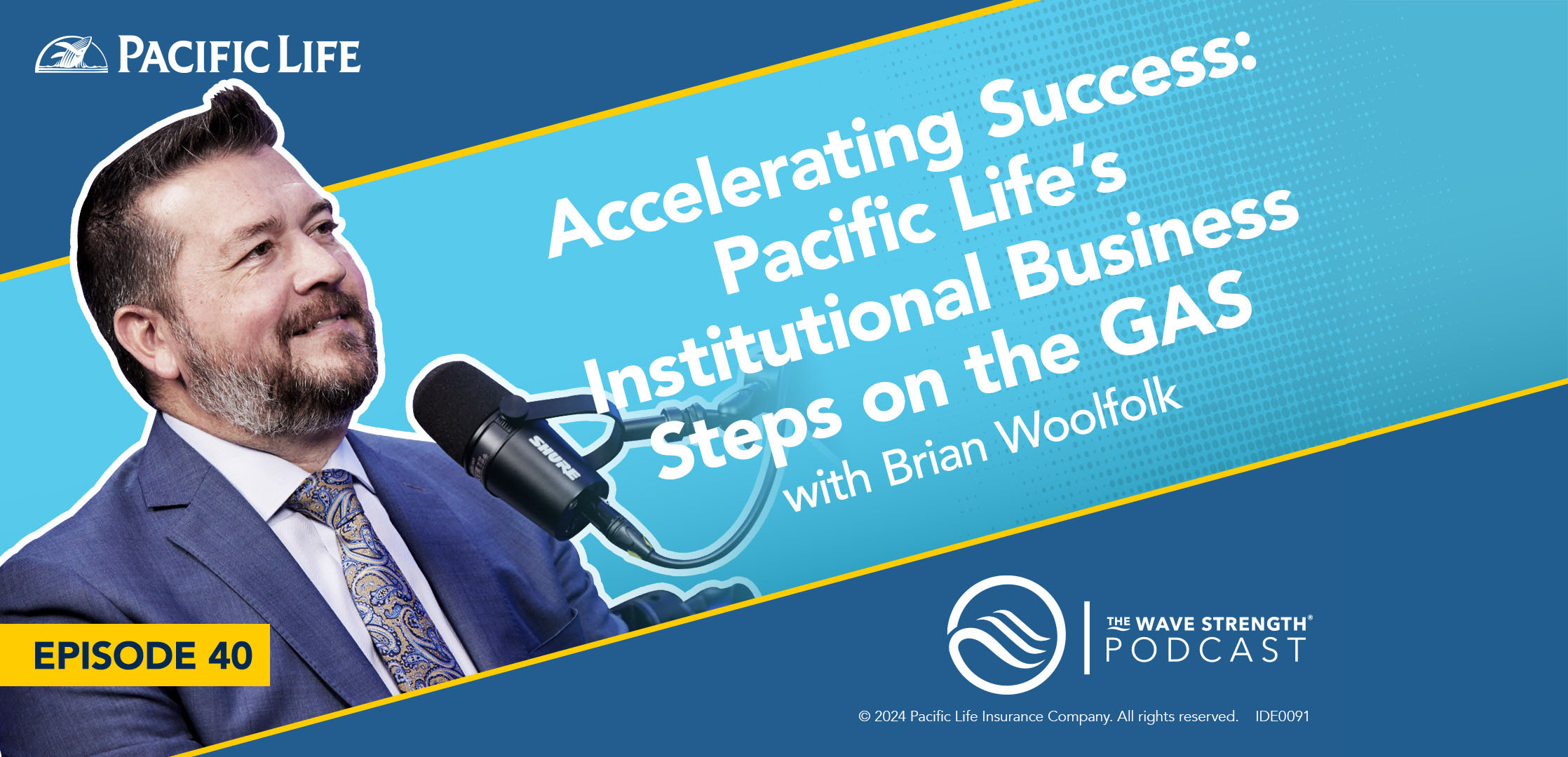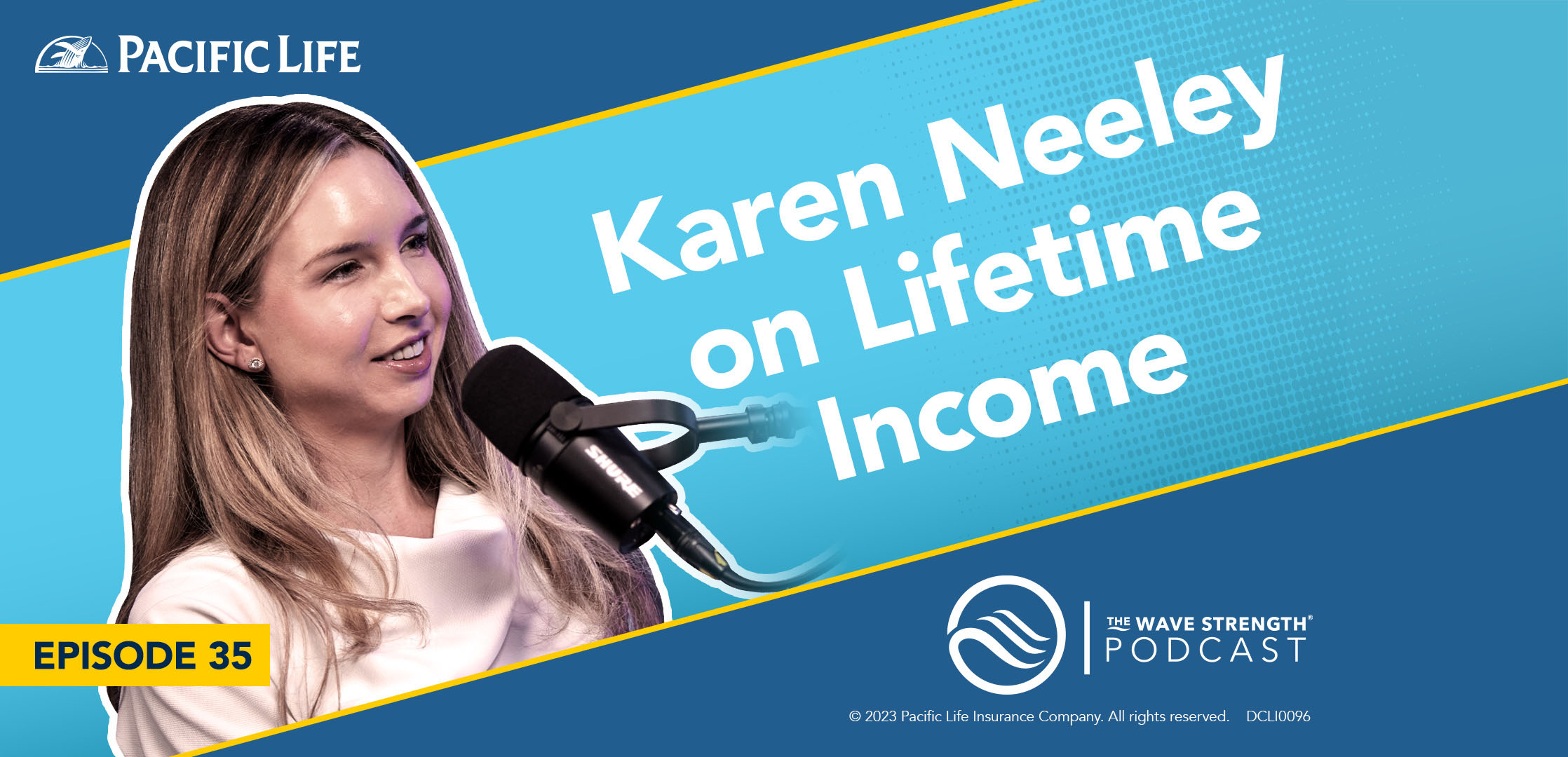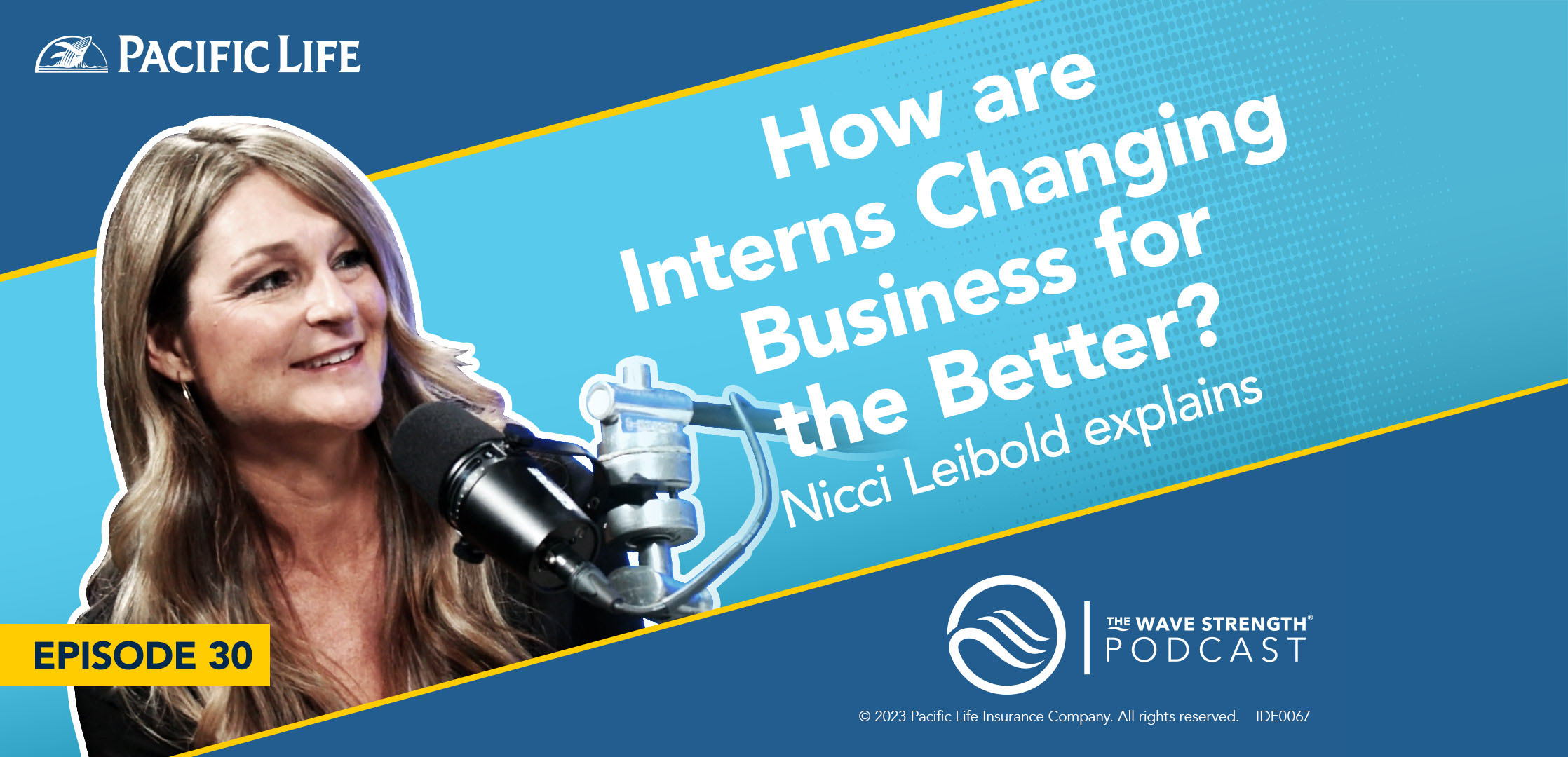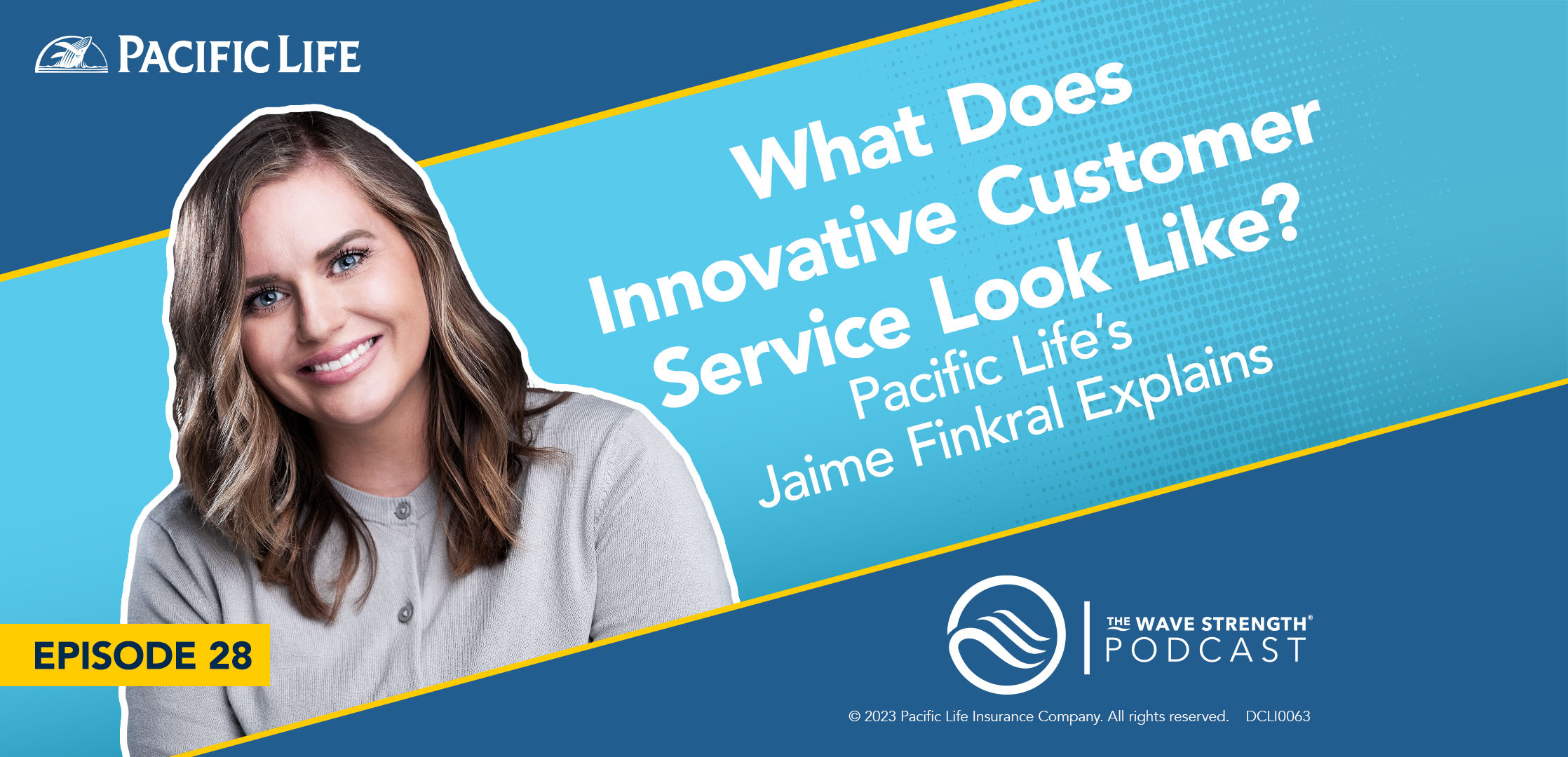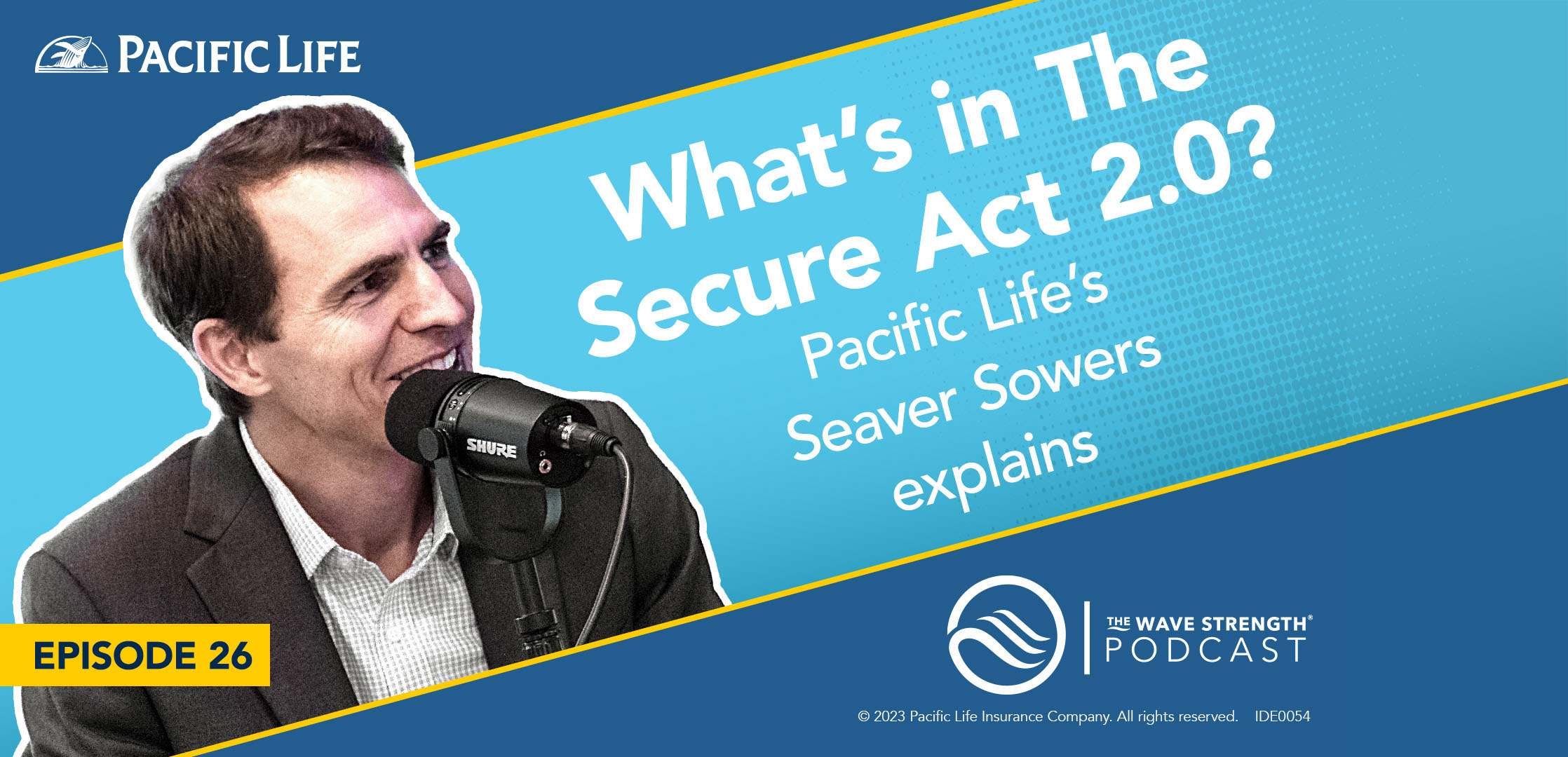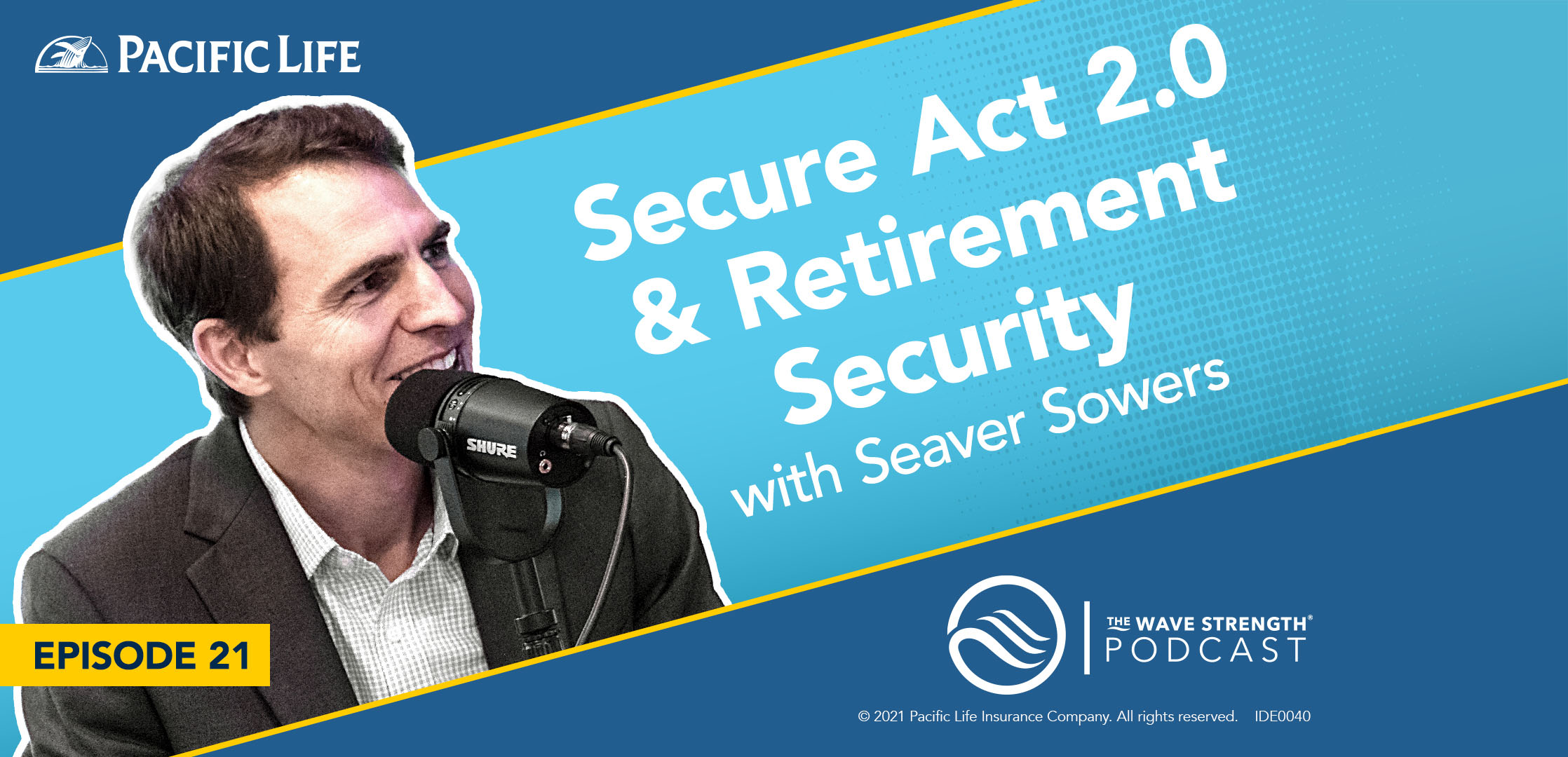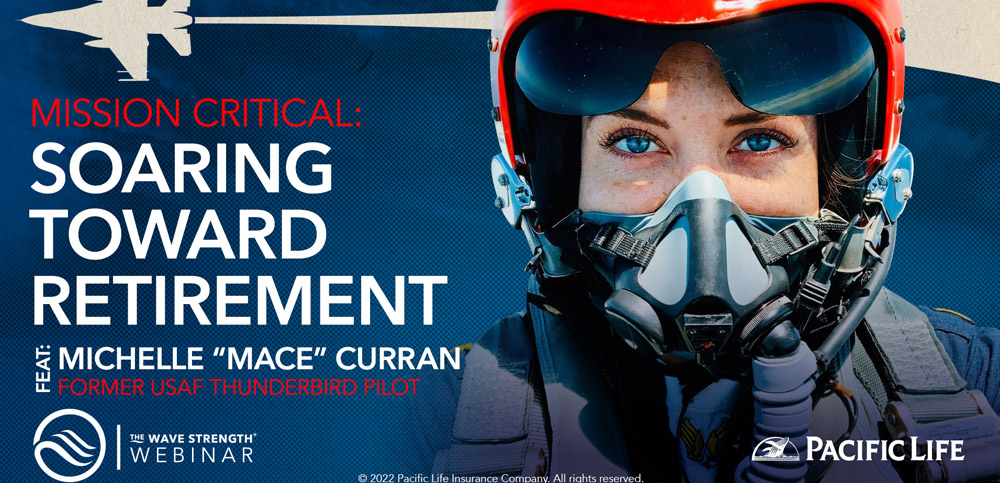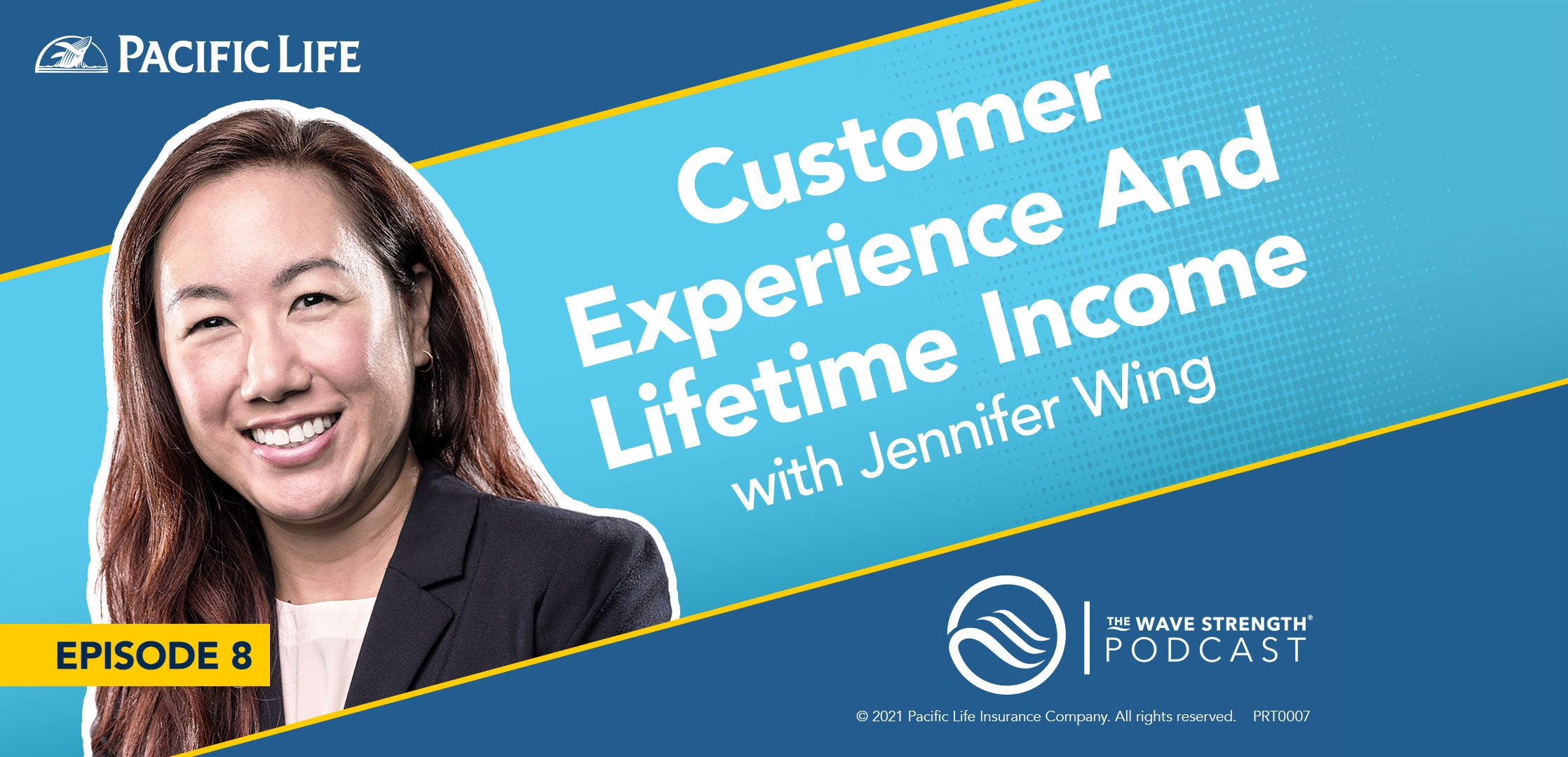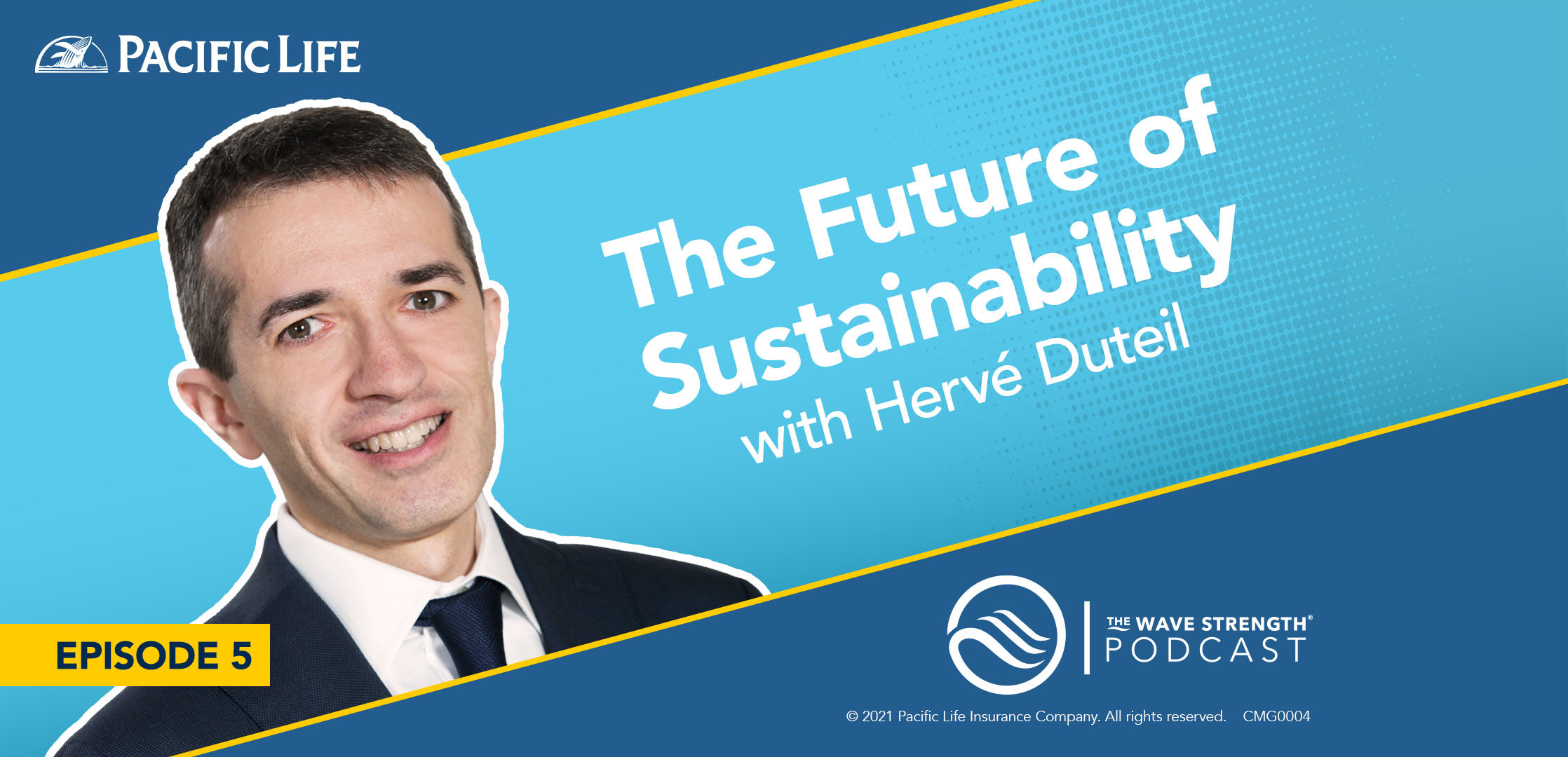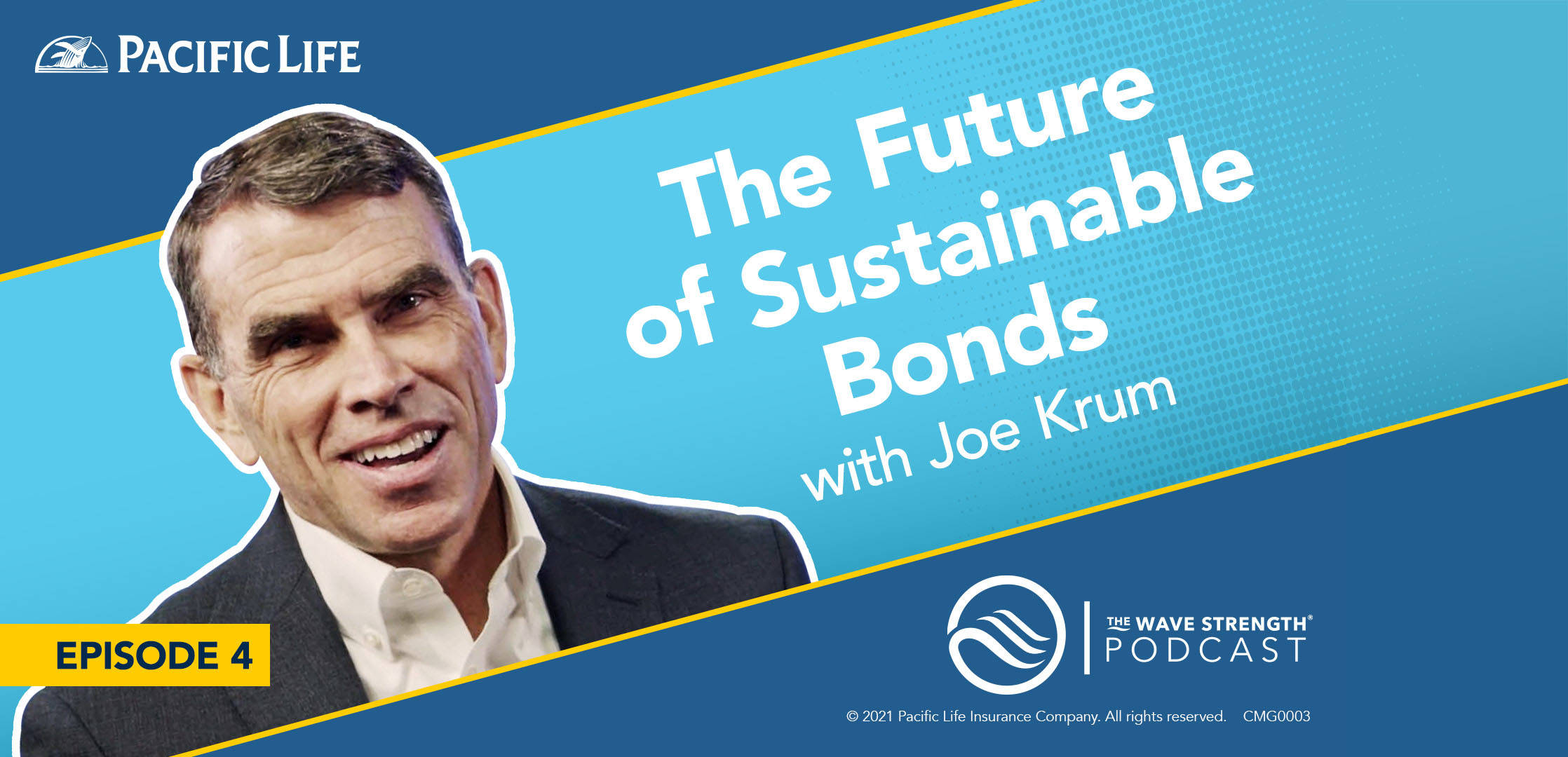Jim Breen: Finding success in challenging environments.
Michelle Curran: I see so many people who have so much potential, they just have to get out of their own way.
Jim Breen: Flying through fighter school.
Michelle Curran: Good thing I was young, because I couldn't do it again at this point.
Jim Breen: And finding growth in uncomfortable situations.
Michelle Curran: And that was the vote of confidence that tipped the scale for me to go do the thing that was scary and uncomfortable, but that I really wanted.
Jim Breen: All this and more on today's episode of The Wave Strength.
Voiceover: Welcome to The Wave Strength. Innovative solutions for a secure retirement. Presented by Pacific Life.
Jim Breen: Hello everyone. And welcome to another episode of The Wave Strength podcast series. I'm your host, Jim Breen, head of marketing with Pacific Life's Institutional team. We're very lucky today to be in the studio with Michelle Mace Curran.
Jim Breen: Michelle is a friend of the show and also a motivational speaker. A published author and a former lead solo of the United States Air Force Thunderbirds team. And if you don't know what that is, we're going to get to it in a moment. But Michelle, thanks so much for being with us again on the show.
Michelle Curran: Yeah. Thanks for having me back.
Jim Breen: Absolutely. You have such an amazing story to tell and there are so many interesting touch points that we've had the opportunity to talk about over the years what I'd love to be able to do today is talk a little bit about, where you have, where you were and where you are.
Jim Breen: I remember you told this story, Michelle, about being that little girl in the Midwest, you had never even been to an air show, right? You'd never really seen a, military jet fly. And then all of a sudden, this was something like when you were I think it was, a teenager or even an adult college, the first time you saw a jet fly.
Jim Breen: That transition, that pivot late in life like that, maybe share a little bit about that.
Michelle Curran: Yeah, I think it's become a trend that's worked out well for me. So I I went to college and I needed a way to pay for it. So I looked at scholarship opportunities and the military kind of rose to the top.
Michelle Curran: And so I applied for an Air Force ROTC scholarship, got one, went to college as a criminal justice major. Planning on doing four years in the Air Force afterwards to pay back what I owed from the scholarship. And then I wanted to apply to the FBI Academy. That was my grand plan as like a 17 year old,
Jim Breen: Which is amazing, my father 25 years in the FBI. And yeah, so he'll love to hear that. He'll love to hear that.
Michelle Curran: Yeah. It's always funny when I share that story to law enforcement audiences or it's, I took a pivot to say the least. So I'm halfway through college. Like I said, on track to do something related to federal law enforcement.
Michelle Curran: I go visit a base with my ROTC unit. And I get to see two fighter jets, two F 15s at Tyndall Air Force Base in Florida take off in full afterburner to go to a training mission at dusk. So it's just orange flame coming out the back. We're super close. So the noise is just like deafening, vibrates your whole body.
Michelle Curran: I got goosebumps. I just had this like visceral physical reaction of, I was like, how do I go do that? Forget the FBI, sign me up for that. And honestly, at that point I was just. Pure excitement and motivation to go try to do this thing. I didn't have a good perspective of how difficult it actually is to get not just a pilot slot, but to actually get a fighter aircraft.
Michelle Curran: And when I decided, Hey, I want to put my name in the hat to compete for a pilot slot. It wasn't, I just want to be a pilot in the Air Force. It was, I want to be a fighter pilot.
Jim Breen: Tip of the spear.
Michelle Curran: Yeah, to put it in perspective, I get that pilot slot, I go to pilot training, there's 25 people in my class, and we end up with two fighter aircraft available, and I ended up getting the second one, which is the F-16, and that was what I put first as my choice on what we call the dream sheet, where you get to list the aircraft that you want to fly, and when I look back now, on the amount of work that went into that year of pilot training to end up top of the class, to get that fighter jet, good thing I was young, because I couldn't do it again at this point, but it was just, The never ending striving for that, right?
Michelle Curran: Like studying nonstop sitting in my home office and practicing flights in my head before I went and did them for real the next day. I was just very driven to a very specific goal and it really acted as really strong motivation. And then it happened and I was on top of the world. And then I got to the job and realized just how hard it was.
Michelle Curran: And it was a little bit of an identity crisis being really good at things, even though there was a ton of work that made me good at things. No matter how hard I worked when I got to an actual F-16 unit, it's not something you get good at in weeks or months. It's something that takes many years to get really good at, and it took me some time, as I think it does a lot of like high achievers, when they finally reach the place they're going, and then they realize, We got here and it's really just the tip of the iceberg.
Michelle Curran: It took me a long time to find my footing in that world.
Jim Breen: So Michelle, you're sharing these stories about how you got to where you wanted to go and all of a sudden you're there and you're like, this is much more difficult than I thought it would be, but your story doesn't stop there.
Jim Breen: No,
Jim Breen: it kept going and going. So clearly you're somebody that is, not afraid of challenge, but as we've heard you talk about it, even in the keynote you provided here at Pacific Life today, even you experienced imposter syndrome.
Michelle Curran: Oh yeah. Yeah. So I, it starts off really well. I get through all these wickets of training, and I do well, and I get this F-16 that I've been chasing for five years at that point.
Michelle Curran: I get to my first combat squadron, and I'm just okay. In my mind, I'm terrible, because I'm used to being good at stuff. I'm used to like, okay, if I work hard enough, I can get good at something very quickly. This is not a skill you get good at very quickly. It shakes my identity, and that feeling of not just being a beginner, But that spirals quickly into almost like crippling imposter syndrome.
Michelle Curran: So I go from normal self doubt that you have when you're new at something, to taking it on as like my identity. Yes. It's not oh, I failed at this thing in this flight. It's oh, I'm a failure. I don't deserve to be here. And there's a lot of layers to that. There's Not many women flying fighter jet, even now it's about 4%.
Michelle Curran: Only 4%? Yeah. Wow. Then it was 2% 15 years ago. And so it was myself and one other female pilot in our squadron. And obviously the jet doesn't care what your gender is, right? Like it operates the same. It's unforgiving the same way, but I think there's a lot there that I was creating for myself about measuring how I showed up, and running it through a filter to try to fit in.
Michelle Curran: And not feeling like you naturally belong in the environment can really increase the odds of going from normal level of self doubt as a beginner to imposter syndrome because you feel like you can't show up as your authentic self, and you have to run all your decisions through this filter before you say anything before you do anything being like, is this what the ideal fighter pilot would do?
Michelle Curran: Is this how the ideal fighter pilot would act, and I would never be the ideal fighter pilot because in my mind and in so many people's mind that person looks one way, and so I think that kind of layered into my story and I wasn't aware of it at that time, but reflecting years later that becomes part of my story.
Michelle Curran: That's can't remove from it. It's so woven in. And I really struggled finding that footing and finding that identity and that really high performance, Type-A, unforgiving environment that is being in a fighter squadron.
Jim Breen: So moving from the squadron, you were in Afghanistan doing so much. And of course, thank you, Michelle, for your service.
Jim Breen: Then the Thunderbirds, even a more elite echelon of the Air Force and pilots in general. But maybe you can just talk a little bit about your experience as a woman as the second lead solo for the Thunderbirds.
Michelle Curran: Yeah to bridge that gap from that time in Japan that we've talked a decent bit about, I got to the point where I was like, I just can't, dress up. I can't like put on a fighter pilot costume and go to work anymore. I just need to start showing up as myself, and it felt really risky, but once I started doing it, I realized that I made closer friendships with the other guys in my units. My performance in the jet increased. My energy was, I was not burned out anymore.
Michelle Curran: Everything got better. I was like dang, why was I so scared of this whole time? I should have done this sooner. I think some of that comes with confidence, that comes with experience of, now I've been doing this career for five years instead of being brand new. It was really that growth pattern of making small, bold decisions over and over until a year later, I look back and I barely recognize where I had started and having that happen again and again from that time in Japan through my next assignment in Texas, which is where I applied to the Thunderbirds from.
Michelle Curran: And even at that point where I had done, so much intentional kind of self work and focused on growth and pushing myself outside my comfort zone. I see the email that the Thunderbirds are hiring. I immediately am like, Ooh. I've always thought about this would be like a cool thing to do. I look at the requirements, I meet all of them, I feel excited, and then I immediately feel that like just almost like physical feeling of dread, of self doubt, wash over, like I'm already gonna fail.
Jim Breen: What did I do? Why, what did I get myself into? I'm never gonna get this. It's, yeah.
Michelle Curran: And it's very visible, like the Thunderbirds are a high profile unit. So what if I do get hired? And then I go there and I can't perform at that level. Now I'm not just performing at that level in front of my squadron.
Michelle Curran: It's like on a massive stage. And so, I think there was fear of not getting hired because it is competitive to get hired. But even more than that, it was like succeeding and then not being able to deliver once I did succeed. But I had a really amazing boss and I went to him and I was like, so sir, the Thunderbirds are hiring.
Michelle Curran: It wasn't like. A movie where I walked in and I was like, sir.
Jim Breen: Like Tom Cruise walks in and smashes the email paper on the I'm doing this.
Michelle Curran: Oh, it was like the opposite of that. I was like, so I saw an email, the Thunderbirds are hiring. And he's do you want to apply to the Thunderbirds? And it wasn't even yes, I do.
Michelle Curran: It was like, I think so. I said, I think so. And in that moment, I was looking at him, to be my litmus test of whether he thought I was capable or not. And it was very short notice. This was the last email that the Thunderbirds were sending out being like, Hey, the applications are due next week. I hadn't seen the other ones, probably just deleted them without opening them.
Michelle Curran: And so it was going to cause a lot of flail to get our application package in on time. And he could have very rightfully so been like. Hey, you probably missed the boat on this one. You should probably apply next year. Instead, he said, you would be perfect for that job. How can I help you get your application in?
Michelle Curran: And that was the vote of confidence that tipped the scale for me to go do the thing that was scary and uncomfortable, but that I really wanted
Jim Breen: Those leaders, those solid leaders to guide you through those difficult moments. They really are amazing gifts in life.
Michelle Curran: They are. And I've told him that story.
Michelle Curran: I don't. Think he would have realized how impactful it was had I not come back after I was actually done with my time on the Thunderbirds and out of the Air Force. And I just texted him one day. I was like, Hey, You might not realize and he was just like really gracious about it, but to get to your question about being on the team, in previous squadrons, I was aware that there weren't a lot of women doing it, but again, I don't think the, it wasn't like the big part of my job being one of very few or the only, it was just something that I was very aware of the jet doesn't care again, when you get to the Thunderbirds, the aircraft doesn't care, but when you look at what the mission of the team is, it does matter because it's recruit, retain and inspire, And there's all kinds of scientific research around our ability to be more inspired by someone we can relate to and on surface value.
Michelle Curran: That's physical appearance, right? So you travel around the country doing air shows at 35 to 40 places in a year. You are literally seen by millions of people. A good portion of that audience are young girls and women. And yeah, If we're looking to recruit or we're even looking just to inspire them to do whatever their big dream is, whether it's in the military or not, they it's a bigger impact when they see someone that looks like them doing that, and I immediately saw that like the impact that I could have because I would have these insane moments where usually a mom would drag her little daughter up to an autograph line after a show, and a lot of kids that age are shy, especially because we're intimidating in our very tight flight suits.
Michelle Curran: And she'd be like, "Look, she just flew, those jets that you really liked," and the kid would look up at me with like wide eyed and I would see a light bulb moment happen. I would see them connect the dots that someone that looked like them did something that they thought wasn't done by people like them.
Michelle Curran: Yes, and it was like an ah-ha moment and it was so cool to do that for people. And I think being a woman in that role just gave me a unique ability to connect with a whole segment of the society and it was just so rewarding.
Jim Breen: As somebody who has seen that firsthand, I have actually watched you fly when you were in the Thunderbirds on a few different occasions where I've had my Children and I now can say to my young daughters.
Jim Breen: I know Michelle Mace Curran, and look at some of the things that she's done, and it is a powerful visual opportunity, and the optics of it are just very profound, but something that is very unique and important for those children to see. And as, a father of two or three girls now, actually she's brand new.
Jim Breen: It's not I forget my kids, she's brand new. Yeah. It's very important to have these strong role models. So Michelle, thank you for all that you do. And I understand you have your first full book full length book available for presale. Can you share a little bit about that?
Michelle Curran: Yeah. It's called the Flip Side, how to Invert Your Perspective and Turn Fear into Your Superpower. And it really takes, these experiences that I've had over the last 15 or so years where I did struggle with self doubt and imposter syndrome and dealing with things going wrong and having to handle emergencies in the cockpit or in my life outside of the jet, and I just learned so much, and there's so many tools in fighter pilot culture that can be translated to anyone, and so each chapter tells, some pretty harrowing stories, a lot of them in the jet.
Jim Breen: I've heard some of them and they are wild stories. I won't reveal any secrets or give anything away, but it's pretty crazy.
Michelle Curran: Yeah, there's some good ones for sure. So I think that's like the thing that'll really be the page turner, but then it's basing in human psychology.
Michelle Curran: Like why did the tools and techniques that we use to overcome those and deal with them work, and how can they translate into anyone's life? Like any problem that we're dealing with, whether you're a fighter pilot or. You work at a desk, right? Like it translates the same. And so the reason I wrote this book is because I see so many people who have so much potential.
Michelle Curran: They just have to get out of their own way, get out of their own way. And if they would just believe in themselves, just a fraction as much as the people around them believe in them, they would go do incredible things. And honestly, when I write the, a lot of guys are attracted to my content because of jets.
Michelle Curran: But when I thought about who I was writing this book, it's true. I look at my social media demographics. It's true. But when I was writing this book and I was thinking about customer avatar and all the things you do as you run a business, I was like, I'm writing this for 35 year old mom who's been out of the workforce and had kids and now wants to go back to her marketing job.
Michelle Curran: And she has filled with self doubt because she's been out of it for five years. Or I'm writing this for the 22 year old who's in med school. And feels like she's been working her butt off and then she gets to residency and is I don't know what I'm doing. And I think it's such a relatable topic for men and women.
Michelle Curran: And It doesn't really limit itself to just young people who are beginners in the workforce. It applies to anyone who's transitioning into a new challenge. And I cannot wait to see the impact it has.
Jim Breen: I feel the same way. I've already ordered my copy. And as somebody that sat through your keynote just a few moments ago, you could hear a pin drop.
Jim Breen: All of our team, all 150 people were just laser beam focused on what you were talking about. So thank you for joining us here in the building today, Michelle. We're very grateful for your time. And we would love to have you back.
Michelle Curran: I hope to come back. Let's make this an annual thing.
Jim Breen: We should indeed. Yeah. We're already on track for that. To our audience, I want to thank you so much for joining us on another episode of The Wave Strength podcast series. I want to encourage you to head over to YouTube, Spotify, and Audible search The Wave Strength, hit like and subscribe so that you can stay current with new content as it becomes available.
Jim Breen: We'll see you next time, everyone.
Voiceover: This has been another episode of The Wave Strength presented by Pacific Life. Don't forget to catch us on YouTube, and make sure to subscribe!
Voiceover: Pacific Life is unaffiliated with any other individual or company mentioned. Pacific Life is a product provider. It is not a fiduciary and therefore does not give advice or make recommendations regarding insurance or investment products. Pacific Life, its affiliates, its distributors, and respective representatives do not provide any employer sponsored qualified plan administrative services or impartial advice about investments and do not act in a fiduciary capacity for any plan.
Voiceover: Pacific Life refers to Pacific Life Insurance Company and its subsidiary, Pacific Life & Annuity Company. Insurance products can be issued in all states except New York by Pacific Life Insurance Company and in all states by Pacific Life & Annuity Company. Product availability and features may vary by state.
Voiceover: Each insurance company is solely responsible for the financial obligations accruing under the products it issues. This podcast was recorded on February 26th, 2025.
Jim Breen: Thanks for joining us on today's show. We'd love to hear from you join the conversation below and leave a comment on your thoughts on what the industry can do better for participants as it pertains to lifetime income solutions. And if you'd like more interesting content, click one of these links over here.


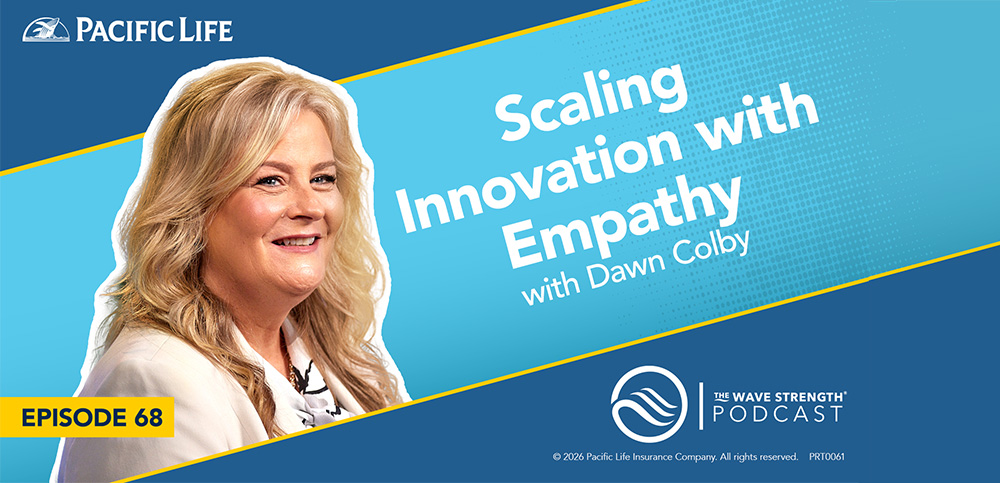
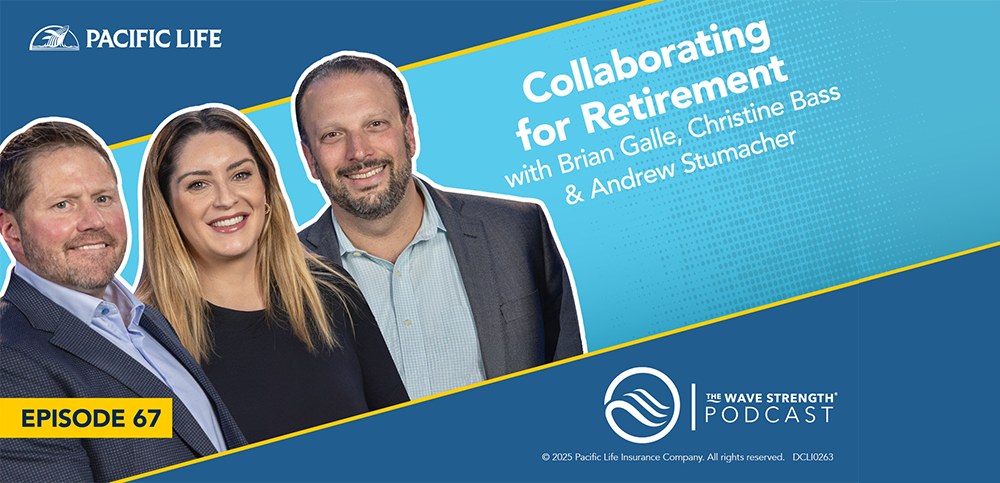
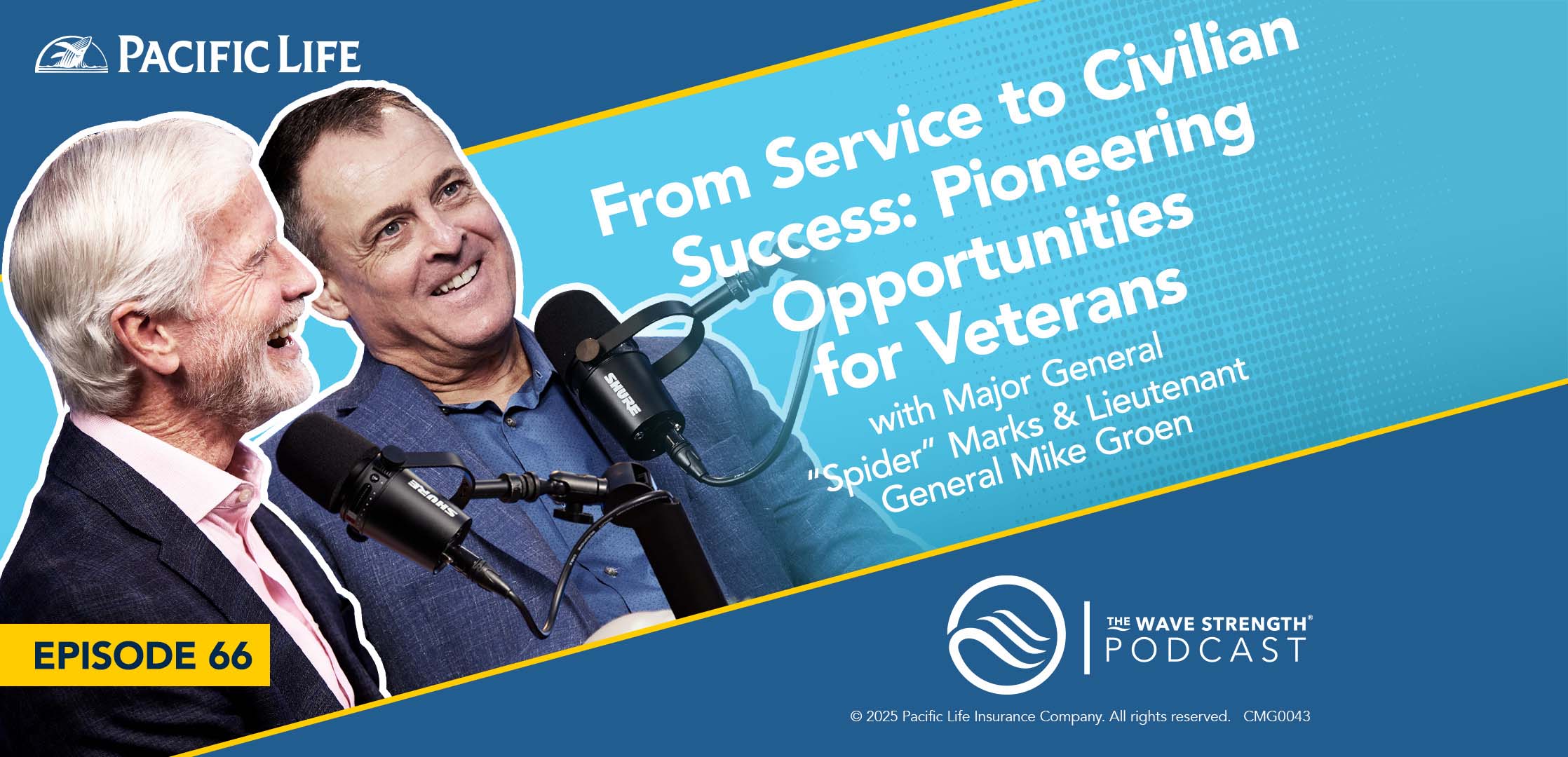
.jpg)

